#ITS NOT ACTUALLY A JUDGEMENT ON THE CHARACTERS INDIVIDUAL MORALITY. IT HAS TO DO WITH THEIR ROLES IN THE STORY
Explore tagged Tumblr posts
Text
the dsmp fandom does not know what morally grey means and it shows like. moral greyness does not mean someone who’s generally heroic who does one bad thing or someone who’s generally villainous but also is like. a human being and not pure evil. like. c!dream is objectively, factually not morally grey. at all. he is a villain that is his ROLE in the STORY it’s FINE it doesn’t mean he’s pure evil and nothing else. it means he plays an Important Role it’s a GOOD THING. same with c!schlatt. c!tommy and c!fundy and c!niki and honestly like a ton of other characters are Also not morally grey they Obviously have hurt people and done bad shit but like. being morally grey doesn’t mean you have flaws it is a Specific Role in between being heroic and villainous and like. Most DSMP Characters Are Pretty Unambiguously Good People Actually. this does not mean they’re Always Good or Never Make Mistakes but they’re good people trying to help others. and that’s ALSO FINE. they do not NEED to be ambiguous. characters can serve a heroic role that’s okay it doesn’t mean they’re perfect people incapable of criticism it’s just how fucking STORIES WORK oh my god.
#anyone who says c!dream is morally grey does not know what the terms they’re using mean#ITS NOT ACTUALLY A JUDGEMENT ON THE CHARACTERS INDIVIDUAL MORALITY. IT HAS TO DO WITH THEIR ROLES IN THE STORY#you can be a villain and still be incredibly sympathetic. you can be heroic and be an asshole!#morally grey characters are those who’s NARRATIVE FUNCTION falls somewhere in between/outside of hero and villain like.#it’s a term for analysing stories… not judging characters on how good of a person you think they are… that makes no sense…#dsmp fandom learn what media analysis and criticism Actually Is challenge it’s genuinely baffling how many terms and concepts are misused#PLEASE. KNOW WHAT THE WORDS YOU ARE SAYING MEAN. GOD
6 notes
·
View notes
Note
So I'm kinda looking for advice. I'm planning to make fic of CRK and was thinking of what if a bunch young witches and wizards(Around Gingerbrave and gang age). It will kinda have the same vibes as the How to Train Your Dragon series. So my question how cookies from kingdoms react to seeing a bunch of young witches/wizard
Okay so, I don't think I can give you any specifics in terms of who exactly would act how. But I will say this, when I tackle a character-driven plot, it's really important to know what you're working with in terms of personality types.
What does a character prioritize in terms of morals and values? What are their personal goals (both short term and long term)? What are they afraid of? What makes them uncomfortable? How well would they handle social interactions with others? What do they care about? Are they the type to shoot first and ask questions later? Or are they more curious than careful?
Think about the cookies you plan to use for this story, observe how they act and what they say, and then extrapolate from there.
For the sake of this example, I'll use Gingerbrave.
Gingerbrave is a noble soul who cares for everyone he deems to be his friend. He is very naive and trusting which can lead to those with bad intentions trying to take advantage of him, however it also opens an avenue to allow those who would usually be shunned to be accepted by him. Rarely does he cast judgement on others, unless they have personally done him or those he cares about harm in some way. He is always willing to extend a hand in friendship.
That being said, due to his previous experiences with Witches, he might be wary when it comes to these characters in question. But if they show him kindness and no outward displays of hostility, he might be inclined to give them a shot.
^^^ All of this was pulled by how I understand Gingerbrave as a character, based solely on his behavior during cutscenes and individual voicelines. Luckily, since he's the franchise's mascot character there is a lot to pull from across multiple games. It might not be 100% correct, but that's the beauty of art: everyone has their own interpretation.
But Gingerbrave is a bit of a unique case, because not many cookies know a lot about Witches and Wizards personally. For some cookies Witches/Wizards are regarded as Gods, for others monsters, and yet others might regard them as mystical beings of legend. Maybe the different kingdoms have different lore based around the Witches/Wizards, but that's something you'll have to come up with on your own as we don't have much to go off of when it comes to canon. Who knows, maybe some cookies have never even heard about humans? It has been a long time, and sometimes history and myth can be lost if its not passed down through the generations.
Think about which Cookies these characters are actually going to come into contact with. Seriously try to put yourself in their shoes. Given the circumstances they live in, and the circumstances they grew up with, think about if they would know about Witches/Wizards and how far that knowledge goes.
For example, the Beasts would be far more knowledgeable about Witches than (most) of the Ancients. White Lily had an experience with Witches, but it was a bad one, how would she regard these children then?
And then on top of that is the fact these are children. Child GODS depending on which Cookie is looking at them. How would you react if you met kids who were very obviously the children of... idk Zeus or something? Would you regard them with wonder? Fear? Nothing at all?
It really boils down to: Who has met humans vs who hasn't. And if they haven't, what would they feasibly know about them from myth/religion?
Hope this helps at least somewhat o7
69 notes
·
View notes
Note
I asked in anon cause im very insecure and I worry Im just annoying other people. So, I asked first to know if it was okay. Now I feel a bit more safe to ask openly.
I have been worried about myself. Doubts. Like, how do I know if I believe in something because I truly do or just because everyone does? Idk what to do. It started when I doubted my religion (im agnostic) and idk, it scared me, like, what if im wrong about something else? How can I know?
What would your advice be? ��👈
I don’t believe in taking people, such as yourself, and forcibly moulding them into some image of myself. I do not want you to become me. Unfortunately, I am still just a person. I can give you summaries, explanations, and recommendations. I can tell you both sides of an argument to allow you to make up your own mind. However, you will need to maintain your critical thinking throughout this. Like I said, I am not trying to turn you into me, but I will have biases. I will lean far more into existentialist framing because of this.
With that said, there seems to be a strong fear of being “wrong”. And before I even start, I want us to be on the same page with removing the moral judgement that we often associate with “wrongness”. There is nothing bad about being wrong. And as you delve deeper into epistemology, you’ll find a lot of debates about if there even is such a thing as being “right”. And that’s why we should remove this idea of moral or character value that comes with “right”. It closes our minds to new information, it forces us to defend ourselves against contrary evidence, and it removes our innate value in our humanity. I want to emphasize that no matter how “wrong” we think someone is, the real value of their character comes from why they believe the way they do.
The question “What Does it Mean to Know” is abstract even at its surface, but I will do my best to keep this accessible. As such, I will summarize in as plain a language as I can the different approaches to this question. To define Epistemology is the consideration of the nature (what it is), scope (where it comes from), and limits of Knowledge as a concept.
Socrates said “I know that I am intelligent, because I know that I know nothing.” Credited as the father of modern philosophy, Socrates would go out to the Athenian markets and would ask questions of anyone who would stay to talk to him. Plato, a student of Socrates who later became teacher to Aristotle, wrote that an oracle at Delphi told a friend of his teacher that “No one is wiser than Socrates”. In this story, Socrates sets out on a quest to prove the oracle wrong as he doesn’t know what wisdom he has. He goes to the political leaders, but they also have no wisdom to be found. He visits the poets but he determines that, while talented, they aren’t wise. And when he approaches the craftsmen he finds them knowledgeable about their crafts, but they think they know more than they actually do.
The modern concept of Knowledge is rooted in Socratic Ignorance. Asking the questions that feel obvious is the first step to becoming aware of yourself as an individual mind. This is what Socrates called “Care of the Soul.” Analyzing ourselves and the world, thus seeking our place in it, is how we care for the well-being of our spirit. After being found guilty of “corrupting the youth”, Socrates was condemned to death. At this, Socrates proclaimed, “The unexamined life is not worth living for human beings”.
In this way, Socrates defined the foundation of Knowledge as Awareness rather than Answers. This sets up his reasoning into the basis of “Universal Definitions”. The greatest folly of reason we fall into is the belief that all persons carry the same understanding of words and concepts that we do. We often forget our place and superimpose our identity onto those we are communicating with. Words are intangible constructs that we have agreed conveys meaning. But if someone were to say “chair”, what image comes to mind? A firm plastic stool and a plush, upholstered recliner are both “chair”. And one cannot convey the image of which chair is appropriate when discussing the events surrounding the “chair”. So one would ask for more information on said chair. Is it firm or soft? Is it large or small? These seem like unnecessary questions, but in order to understand the world, there must be a basis of awareness of the third subject in the discussion.
This leads into Hegel’s basis of “Truth” in the 1807 essay The Epistemology of Spirit. Hegel argued that the ability to conceptualize a concrete Truth was at odds with how we functionally interact with the world. To condense the example given from this video essay summarizing Hegel’s writings, there is the worm and there is the rock, but there is also the “I” examining the worm and the rock. In no way will I be able to truly know what it means to be the worm encountering the rock. Furthermore, in no way could I comprehend the idea of how a worm would conceptualize my mere presence as an observer in its encounter with the rock.
Just as atoms are never touching each other, we are always barred from accessing this objective realm of reality through the barrier of being an ever present subject in the design of said reality. Truth will always be to some degree subjective. And thus the act of knowing will always be dampened by the limited myopic lens of our own perspectives. We are forever doomed to fall short of ultimate truths. So the most objectively correct understanding we can conceptualize Knowledge as is to know that one will never truly know.
At the same time, we cannot simply sit in stagnant impotence. Which is where Camus' Absurd Freedom comes in. When it comes time to figure out what you believe, you have to simply decide what that is. You have to simply choose what you believe, which is why it is so important to remember that no matter how ironclad we think our reasoning is, at the end of the day it is still just an arbitrary choice we made.
I’m not sure how much of this will actually be helpful as advice. To be frank, this all boils down to:
Always leave space open to be wrong
There is nothing Bad about being Wrong
Remember you are limited in what you can realistically know
Ask questions, no matter how simple/obvious they seem.
I understand if this may not be the advice you were seeking, and if there is any specific advice you seek from me, you know my inbox is open. But I hope this could help you feel less overwhelmed by the unknown. It’s terrifying to be questioning everything, and it takes a lot of courage to allow yourself to question what you have always taken for granted. I hope this little essay could maybe inspire a sense of grounding against the turbulence of existential crises.
youtube
#ask and answer#philosophy#socrates#georg wilhelm friedrich hegel#albert camus#soren kierkegaard#advice for life
2 notes
·
View notes
Text
I was discussing recently with my best friend the seeming inevitability of evil, the impulse of selfish desire, and the presence of that in storytelling - the lusty attraction of evil, the draw of power, the unceasing denial of lesser inclinations - and as much as I think that is valuable for the study of character and the human condition, I am also very interested in its natural opposite which I think to be just as true yet rare in portrayal: the denial of goodness, the suppression of compassion and empathy, an actual exercise in culling virtuous behaviour for the sake of other principles (or a warped sense of virtue).
This interests me not in the sense of painful self-sacrifice; I really mean in the sense that goodness can be attractive in the way that evil and selfish impulse can be attractive. (Painful self-sacrifice's inverse - the pain of evil - actually does inversely interest me. Evil which hurts and good which heals). I have discussed this a bit under my #redemption arcs tag and also realise that Ursula K. Le Guin (I am fairly sure it was her edit: it was Simone Weil I was thinking of, it was Le Guin on the terrible banality of evil by itself, both probably quoting Hannah Arendt) has commented on the exciting wickedness of evil in fiction versus its realistic banality, but I am not drawing the same emphasis as her on delineating fiction and reality (that goodness is boring and plain in fiction and exciting in real life) because I don't think it's a clean delineation, and I disagree with her. Goodness in fiction tends to be boring because it is written in such a way as to believe that moral goodness is boring because it is simple, and that people are not attracted to it on an instinctual, emotional level - that it can be magnetic - because goodness is only a consequence of principled behaviour, which is by nature boring because rules are boring (as believed), and probably because the idea that goodness may be personally rewarding or attractive in some way seems selfish which consequently seems immoral, due to a flat, transactional view of human action and motivation.
I'm not arguing from a hedonistic perspective, that if something feels good then it means that it is good. I mean that it's compelling in an instinctual sense because humans are drawn to good and evil in equal ways because we are moral creatures, and the emphasis on the attraction to evil is to the detriment of appreciating both sides and the reason that humans are subsequently attracted to evil. It is not that we are simply compelled to actual selfishly because we are automatons driven by strict need; in making moral judgement altogether, we are engaging in moral behaviour, and moral judgement and behaviour orders desire. Such a flat view of survival need is probably a troubling product of evolutionary psychology, which tries to reason human behaviour based on strict evolutionary incentive, in a recursive feedback loop: if humans survive, then humans do whatever they can to survive, because there is no strict physical way to measure the human condition and that which governs the psychological, moral qualities of survival (though they do try). Somebody alive and unhappy and indulging in vice is alive in the same way that somebody happy and virtuous is alive. (To measure the course of human history in terms of what leads to group survival is a whole other question, especially when group versus individual survival is pitted against each other).
The idea that there are 'bad' people - bad characters, in stricter moral terms which fiction allows for - who have to deny goodness, or can indulge in goodness - compels me because we are furnished with good characters who must deny lesser impulses or fall into vice. Good and evil are not equal (and I don't think I'm even proposing that necessarily), and evil is overrepresented as something which somebody must go out of their way to constantly quash.
There's a theological discussion there, and a cultural one, and an even bigger philosophical one, because it is literally the question of good and evil, but there are two ideas I'm getting here in storytelling: bad people who deny good impulses, and good characters who can encourage their own impulses towards goodness, and another idea, which is that goodness on its own can be rewarding and exciting in a story, not clichéd and overwrought, twee and fluffy. It's a matter of experting framing and tone, really: if you write goodness as boring and a cheap reward to an ill-thought structure, then it will feel boring, but not as a product of the fact that goodness is boring. This is inversely related to evil: the reason evil can feel exciting is because it is where impulsive desire can be squared out; it gives the hero purpose to sharpen themselves against; it's where all meaning in the story is really derived.
The idea that bad people deny good impulses is interesting because I think it affords bad people agency in not just that it is a choice to be evil but it is a separate choice to also reject goodness. It's not a moral binary; both can co-exist. A villain could donate money to orphans. It is naturally not true of everybody at all, but what I am proposing at all is that people can have an instinctual reach, desire, impulse, or a subconscious inclination to do acts of good in the same way that somebody may have to suppress acts of evil. The latter of these is considered a personal and socially noble task; the former, then, in its inverse, is self-abnegation as well as social failure. Abandoning responsibility to oneself interests me, because evilness, or the denial of goodness, as something which is actually bad to the responsibility one should have to oneself - that is, something ostensibly selfish! - squares out the issue of evilness conflated with selfishness, to me.
I think goodness in characters - outright redemption in villains, whatever that looks like - can be exciting. It's a philosophical question to me but it's also a narrative question. What would it mean to be attracted to goodness? How would that change the relationship to the seeming inevitability of evil? What if goodness were sexy - attractive, magnetic, compelling, requiring conditioned denial, even kneejerk rejections of the very suggestion otherwise - what if evil people suffered for being evil, even in a cosmic sense? The first person injured by evil and injured by self-abnegation of goodness is that evil person (though some may consider this a cold comfort, this is my personal view).
I like the idea that goodness can be thrilling. It's hard to do properly because traditional narrative structures allow evil to be interesting because evil can be unprincipled, and it can be human, either because human nature is perceived as fundamentally evil or because heroes must be so perfect as to be beyond reproach - that which is good cannot be human. To hell with that.
#redemption arcs#stirring the pot#I have discussed this topic before#real ones remember haha#I went into more detail I think
3 notes
·
View notes
Text
End of freedom
Olasubomi Williams had a prophecy that not only will Donald Trump reign in America for a short time, but also how and why America will become an actual fascist state in due time even if it’s been speculated before, it will officially become one in the future. It’s been bandied on Celestial’s and Glynda Lomax’s blogs before as well, that America will eventually lead the way in totalitarianism. If America is Mystery Babylon, since Mystery Babylon is described as drunk on the blood of saints, then America will really persecute more Christians in earnest. This may have occurred on the individual level before, especially in William Murray’s case regarding his mum, but this one will be systemic. For those who don’t know, William Murray was a pastor whose mum wanted to ban Christianity in America.
Both she and his two other relatives conspired against him for his faith in God that they were eventually killed for refusing to bow down to God, that if America were to start persecuting Christians systematically then it will be brought down for what it’ll do to them. Even if persecution towards Christians is largely at the individual level in America at this point, I feel the thing about Madalyn Murray (I got her name wrong before) is a harbinger of things to come. Not only did she strive to ban Christianity in America, she brought over murderers and wrote for porn magazines. America has a high number of murders and popularises porn that despite calling itself a Christian nation, it has effectively and practically abandoned God. I even think its allies are in danger of doing the same thing too.
I even said that the Philippines is under judgement for its myriad iniquities, despite calling itself a Christian nation too, because it repeatedly blasphemes God, condones nearly every sin imaginable and is at risk of becoming as secular as Europe currently is. By the time Filipinos rush to legalise gay marriage, it will become a secular majority nation. This will only hasten God’s judgement of this nation, wherein this country succumbs to China and there’s no escaping because it reaps what it sows. It doesn’t want to repent immediately, so over time it doesn’t just accept secularism as a way of life but also things like apostasy, communism and false religions like forms of Daoism and Hinduism. Laicity will become a major defining part of the Philippine character, not Christianity anymore.
But this means the Philippines has already lost its moral compass and is in danger of doing so at this point, where it is condoning almost every sin that no sooner or later after legalising divorce, it will legalise both gay marriage and abortion. More Filipinos will profess unbelief similar to that of the European countries, but this only hastens China’s ability to take over it for good. Because the Philippines is frequently drunk on America’s cup that God will judge it for partaking in the same sins as Babylon does, that he’s going to let its enemy China take over it for long. So it’s a case of God using the wicked to punish the wicked, in this case China to the Philippines and America.
China and Russia wouldn’t just take over parts of America, but will actively undermine and attack it in the coming years. Both of them will take over its former allies, because of their own sins that it’s on them why these two got them to begin with. China will take over the Philippines just as Russia takes over all of Europe and parts of North America (Canada and America), it will be a terrible irony that for all its Cold War rivalry with Russia it’s America that will become a totalitarian communist state. As I remember Celestial saying that Russia will house a form of capitalism that puts other capitalist economies to shame, a kind of ironic role reversal of sorts and why you shouldn’t judge others, lest you be judged yourself (this is what I struggle with).
So America will be judged, turned into a totalitarian state and then disappear forever. As for the Philippines, it is at risk of becoming so strongly secularised as to lose its moral compass. Not only that but the Philippines will come to accept the unacceptable, ranging from gay marriage to a form of either communism or socialism in the future.
1 note
·
View note
Text
Hi Courtney! 🧡🧡
I'm finally here and have started reading this. And boy, this is one to savour and take the time to read.
Firstly, I absolutely love the world building you've done at the outset to create this rich and lush setting of heaven and hell. The descriptions are so vivid, it's as if I can see each stage of her journey unfold. Here is your talent for describing things really doing overtime, as Nanami would put it, lol.
In terms of character building, the fact that the Reader angel is known for her boundless curiosity and temptation into KNOWLEDGE is such a great way to introduce the themes of this story. Forbidden knowledge, and all of its complexities, the idea that she is supposed to possess black and white morality as an angel, but what she feels, even at the outset, does fall into the character of 'grey'. To seek knowledge, regardless of its nature, simply for the sake of knowing more, HAS to fall into this category.
The descriptions of the relic and its location within a 'tree' of knowledge is so beautiful. The symbolism is incredible and haunting. Especially your choice of hemlock as the plant that lines her path.
"In times like these, you find yourself turning to the one manifestation that has never answered you, but exists in your very being." These lines resonate so hard with me. The fact that she prays so fervently and acknowledges that she is damned by the thirst for knowledge is like acknowledging a part of yourself that you've always wished was different, but you recognise that it is the core of you, and shouldn't be changed if you want to be true to yourself.
OH GOD. OKAY. The way you've written Demon Nanami *chef's kiss*. I strongly believe that this is the best way he could have been written. He is beautiful, bewitching, elegant and seductive beyond measure. God, I'm shivering. There is the mystery of who he is in her memories, but the section where she describes having memories of him in the human world, with the glasses and tan suit as his chosen appearance, and the way he occurs amongst this universe's version of cursed spirits is just INSPIRED. I LOVE, LOVE when writers find ways to pay homage to the source material in such inventive ways and this is one of them.
Also, Heaven? What the fuck? Wow. She's a sacrifice. Wonderful. But this turn of the narrative is so appropriate and also, sort of a commentary on human religious faith being judgemental of those who seek to question the world around them, who don't accept the rules, regulations and status quo with blind faith. The way those people then become outcasts.
"Your eyes bubble with tears. It’s an unfortunate hand that you have been dealt. A hand always opened to you in promise even as the other held a dagger behind the back of divinity." I wasn't expecting this story to take me down a philosophical path, but that's the beauty of your writing. This line encompasses what so many people actually experience in their faith. You are rewarded for compliance, but damned the moment you place a foot out of line, the moment you act with individuality and purpose. This is what occurs when faith is dealt through the hands of those who are decidely NOT divine, but have appointed themselves as such. So accurately depicted here through the microcosm of Heaven in your story.
WOW. Right. I love this so much. Here is that element of 'grey morality', in its truest sense. An action deemed by society as 'wrong' has been committed, in these souls that the demon has saved, and yet, wrong to whom? What was the intention of the act? If the mother saved her child and was still condemned by human laws, then shouldn't she be on the receiving end of mercy from Heaven? A stunning parallel drawn here.
“It is true that I gain my strength through corruption. But it is corruption through intellectual rebellion and questioning minds. I am strong because no matter how many years may pass, there will always be a soul that questions.” UGH, I APPRECIATE THIS SO MUCH. This is a theme I love seeing explored in media (explains my love for Assassin's Creed) and this is such a close parallel to those themes. Intellectual rebellion, the seeking of knowledge, possessing that knowledge which is your right, and then having the freedom to decide what you will do with it ... isn't this the essence of being human?
"Each stroke of him feels like corruption, like freedom, like finally coming home and you arch into him for more." I love how even here, Nanami embodies the role you've given him. The idea of freedom of choice and the fact that what he offers, sexual, or otherwise, is not inherently evil, but we have been conditioned to see it as so ... it's masterfully done.
Also, during the sex scene, your descriptions are so tasteful and beautiful. The imagery you create, of the sensuality they engender, of the CONTRAST between them, the purity of the angel and the magnificent hedonism of Nanami's form ... I'm just here. Absorbing this. Mesmerized.
"Your wings stretch and flap behind you, sparse feathers wafting in their air to fall around you both in white, grey, and black." The symbolism of this line is wonderful. Also, the subsequent completion of her corruption, the way he supplants her Supreme Being with himself, the way the monolith also echoes their union, is so amazingly depicted through your imagery.
"Worshipped by his hands. Worshipped on this altar in front of a monolith that watches over you both." THIS. THIS. I cannot stress enough how important this line is. There's now a subversion of the distant and selfish faith she's always known. This is the altar on which HE worships HER and one can't help but feel that this is the way it should be. Even though she was intended as an offering, he gave her choices and freedom, and seduced her with those very things. She is no instrument to him, as she was to the Heavens. He truly sees her as a desirable being with agency.
"When he dips your head beneath the surface, it feels like baptism in reverse—washing away heaven’s hold rather than blessing you with it."
OH MY GOD. You were inspired when you wrote this one. BAPTISM IN REVERSE. The imagery is killing me and making me scream for MORE LOLLLLLL. Demon Nanami is surely the one true lord and saviour of aftercare 😌.
Once again, the contrast you've painted between her pained longing for acceptance, her loneliness, the way she has been repressed and controlled by Heaven, and the way Nanami treats her, with reverence, passion and respect for who she is, just stands out so proudly. It's such a stunning allegory for the way we can make choices that free us from the bondage of conditioning and society's expectations of us.
Yes, I have been treated to the most amazing depiction of monster sex, but also, this story speaks to me on so many levels as a woman. I loved every heady, dreamy, philosophical moment of it. Your writing, in a sense, is like demon Nanami, luring me down a fragrant path to the beauty and complexity of your ideas.
Thank you, thank you, Courtney. This is going down as one of my favourite Nanami fics ever.
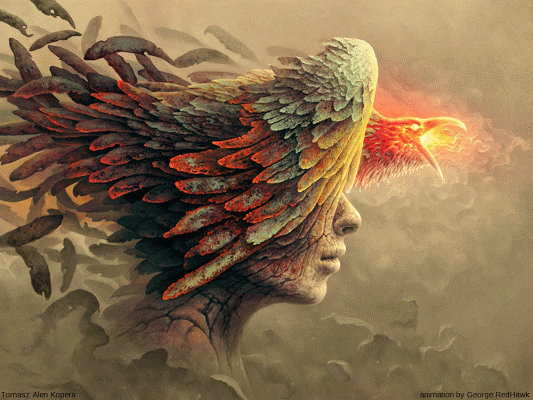


Pairing: Demon! Nanami Kento x Angel Black!Fem Reader
Rating/CW: grey morality, religious undertones, corruption kink, worship, power dynamics (subtle fem submission), monsterfucking, smut, tongue fingering, pronged tongue, vaginal sex, oral (f! receiving), mild blood/biting. MDNI!
Summary: The thick muscle of your wings press against cold ancient stone as he circles you with wicked, stone-faced intent. Glimmering obsidian fingers trace along your feathers until they quiver--fluttering with touch-starved bliss no angel should ever feel. It's forbidden--this sensation in your belly, this humiliating slick between your legs that be can smell, this overwhelming desire that you've spent eons trying to quell.
But now, trapped before a demon so captivating that you can't help but feel equally terrified and dreadfully aroused, reality burns your skin like the holy water that bubbles whenever it's within your reach.
You're not here to serve a divine purpose--you're an offering. And only Heaven knows if you'll fall to your knees before him, begging for corruption.
Author Notes: Here it is! My submission for @tsukimefuku 's Spookinky event! I had so much fun writing this. Thank you, Fuku, for hosting such an awesome event, and I truly apologize for the filth (I do not apologize). Thank you all for your support, and thank you, @aliasnnmknt, for letting me use your art for my banner and helping me create it. Your art really inspired most of this fic!
Header: art by @aliasnnmknt | Divider: @arcielee @enchanthings | network tag: @pixelcafe-network
JJK Masterlist | Twitter | Ao3
©mysteria157, all rights reserved. DO NOT copy, plagiarize, reupload, modify, or translate (without permission) my work to other accounts and platforms.

You’ve never set foot in a demon’s realm.
You’ve heard the stories—flames that burn flesh from bone, screams that echo for eternity, demons that feast on corrupted souls. For the many eons that you have been in existence, the pristine light you thrive in tells enough horrid stories to keep you away.
You do what you can to show you are pure in your thoughts and heart and that you will walk the line given to make the one above you proud in His selection of you. You’ve done well. It’s why you’ve been given this task—a pilgrimage to a sacred altar within this dark realm, to find the relic it holds and be promised enlightenment and a deeper connection to your spiritual life. For once, you feel special. You are special.
The relic you search for holds ancient divine text that the Heaves would like to make sure does not fall into the wrong hands. Your ability to decipher that text and other old tongues made you the perfect choice—though you try not to question why that ability exists at all. This mission feels important and they insisted you were the perfect choice. Your gifts would serve the greater good. Serve Him.
Maybe that’s why they sent you alone. A single angel, moving quietly through dark territory, would draw less attention than an entire group.
Finally, after so many years of wary glances and hushed concerns. Your many ‘gifts’ that have set you apart—the way ancient texts rearrange themselves under your touch, how you see patterns in chaos that other angels cringe from, your thirst for knowledge that shouldn’t be explored. Finally, it’s all paid off.
Or…at least that’s what they told you. Even as something in your grace whispers warnings you choose to ignore.
Angels bask in absolutes, in the pure warmth of divine light and the straightforward clarity of purpose. There is certainty in right and wrong, never a grey in between. Your wings should bask in holy breeze, not in this thick air that tastes of dreadful sin.
You expected the realm to smell of death and destruction, to look as if every natural disaster had run through the land so the shadows could roam freely to commit sin. It’s what you’ve been taught at least. This Realm specifically is forbidden and faith has been used as a boundary to keep other angels in line.
The outskirts of this realm is covered in a haze, a thick russet fog that smells of ozone and decaying flowers. It settles on your skin like an uncomfortable garment, scratching the surface and burning your dermis. Your wings curdle in pain, burning to ash and regrowing through your bleeding muscles. Gnarled, skeletal trees reach up like claws, the birds that sit on their branches malnourished and dying. Distantly, you hear the constant drip of water from a faucet, yet there is no water in sight. Whispers of sin and moans of agony carry on the wind.
Your white dress flows like liquid moonlight, now stained with ash and ember burns. The neckline dips lower than most angels would prefer.
“To be comfortable in the vessel He gave you is to honor His creation.”
Is what they had said, their justification now seems like a cruel irony as the fog caresses your exposed cleavage with burning fingers. The bottom of your dress trails on the ground as you walk, the dirt burning with red soil that seeps through the toes of your bare feet. It feels as if you’re walking on hot coals, the heat burning the fabric of your hem in tendrils of smoke.
You knew to expect this pain, but it’s different. There is a calculated precision to it, intentional in how it burns you as if testing if your form is solid, if your soul is worthy of corruption. The bell sleeves of your gown flutter in a nonexistent wind, ash and soot collecting in the folds of fabric that they once praised as divine elegance.
Your eyes burn, tears streaking melanin-soaked skin that cannot absorb the shrouded sun up above. As you navigate blindly through the oppressive haze, the shadows around you morph with the darkness and skitter past you on multiple hands and contorted feet.
An infinitesimal part of your grace shivers in fear. It’s small yes, pushed away and ignored like you have been taught, but it’s there in the quickening of your pulse and the break of sweat on your neck, it’s there as you walk further through the vicious landscape of horror and pain, as you try to ignore the gurgling of what you do not know from all around you.
Your wings curl around your body, a small gesture of protection that you fall into when the fog gets thicker. It slides languidly up your nostrils and down your throat, catching along the corners. You cough, sputtering wildly through ash and decay, your eyes bubbling with more burning tears. That fear flickers again in your chest and wiggles like a worm in search of moist dirt in your rib cage.
You can do this. You have been chosen. Your lips curl and part as you recite your prayer in silence, asking for strength even as your fear climbs higher to the surface of divine worship.
Then—through burning tears, you see it. A path of pure obsidian that cuts through the horror, its surface covered in a thin layer of water that reflects starlight not in the skies above. Your feet pick up in pace, moving before conscious thought, drawn to its dark beauty and vast difference of the world around. The moment your toes dip into the water-slicked stone, the moisture sliding off your skin without wetting it, everything changes.
The burning on your skin and feathers stops. The pungent fog parts like a curtain and dissipates into the air. You pull in a deep breath, savoring the thickness that is no longer there, your throat coated in clean oxygen. Your dress, moments ago stained with ash and fiery burns, returns to its pristine white. Once the tears in your eyes clear, you take in the changed landscape.
Perhaps the realm only transforms if one gets this far, because now there is no destruction but a defiance of what you see. The sky is tinged a permanent grey, overcast even though there’s a warmth to the low hang of the clouds. There are no lakes of fire, and the ground beneath your feet is no longer hot with clay-colored dirt that seeps between your toes. The obsidian path winds before you through tall garden walls of pearly white flowers, the leaves pitch black instead of earthly green.
Above the dark canopy of the garden walls, a monolith looms tall, piercing the grey sky as if demanding to be let into the heavens. It’s built to resemble a vast tree, its surface rippling with starlight, the bright core pulsing like a heartbeat, beckoning you deeper into this realm of misconstrued beauty. The garden path must lead to it. Even the pearly white flowers weaved into the walls all point forward, ushering you on.
Your wings furl closer to your spine as you shuffle to one of the garden walls, hesitantly reaching for the flowers twined in the vines and leaves. It’s a beautiful white, with small petals that curl toward a sage core. They’re littered along the walls, a beautiful landscape against darkness but the closer you get, the more you realize—
Hemlock
A poisonous flower, the symbol of death, betrayal, and sacrifice. It sits in it’s refined beautify, enhancing the black leaves around you, but they are just as dangerous.
You snatch your hands away as if stung, clutching the fabric of your dress like a lifeline. You try not to think about how the hemlock watches you with pale eyes. You try not to think about what they represent. You try not to question why these flowers would point and line a path to the divine relic you seek.
With every step you take, the pulsing from the monolith in the distance vibrates through the ground, the water rippling currents with each beat. The obsidian path narrows, forcing your wings closer to your body, your arms so close to the deadly blooms. The garden walls rise higher, leaves trembling in that same empty breeze.
While the air no longer feels thick, it is heavy with a taste both nonexistent and flavorful. Flavored with the knowledge you seek when others do not look and secrets that make your eyes linger even as your grace warns you against it. The questioning urges of your nature that Heaven always tries to quell stir awake like a beast being poked after centuries of rest.
You should ignore it. You should ask for forgiveness and count the blessings you have been given in this long existence. But your heart leaps at the chance you have also been given, right now.
The monolith’s base reveals itself slowly, the garden walls parting gradually with dark promise. Your breath catches at the sight—this is no crude demon architecture. The structure rises before you like an otherworldly giant, jet black vines weaving within its bright innards.
You’re struck by the beauty of it all, a resplendent sight that you never imagined would bless your eyes. And as you draw closer, the glass obsidian floors open up before you. From the open floor, a column of marble rises, its surface bleached bone and covered in aging vines and greenery.
On that altar, rests the relic you seek. It is no crystal that contains energy to create vasts universes. It is no seed that once planted will wreak destruction with its pollination. It is no emulate capable of manipulating time.
It is a book.
A single book that is thick with words of forbidden knowledge, its cover worn and weathered from eons of hiding in the shadows, its pages yellowing along the edges.
Such a simple relic, but you feel it’s dark power from your spot at the altar.
You’ve been tasked to tuck it away and sneak back to Heaven, to deliver it to your superiors and be given your eternal reward. While simple in theory, your hands hover over it, hesitating with shaky fingers.
Do not open it.
Do not look at it for longer than necessary.
Do not look inside.
These are your rules—your absolutes. And yet…
Your fingers twitch, reaching and pulling back at the elusive call of the tome, your feathers trembling with a desire you shouldn’t feel. Your eyes burn with tears of veneration as the symbols on the worn leather illuminate and rearrange before your eyes like dancing embers, the translated text reading in your mind like an endless scroll.
Do not look at it for longer than necessary.
You snatch it up, pressing it to your chest as a means to stop your racing heart. Your soul palpitates with want, a baseless need to curl your fingers under the lips of the book and tilt it open.
It’s temptation, that festering desire that always seems to coil in your belly when the explanations you are given never feel right, when the world around you seems too pristine and you want to know more, when you linger in the mortal realm, watching the humans with a curious eye that is more than what is required of you.
It’s quick and on a whim, you pulling the book from your chest to look down at it, as if by looking it will answer the questions you seek. You trail your fingers along it’s ancient skin, soft and unmarred fingertips feeling along ridges and scars along the cover. It looks as if the relic has gone through it’s own personal Hell, no doubt jerked around from realm to realm over the centuries, pried open and its secrets stolen. There’s a faint beat of sadness that you feel in your chest at the thought of what it must have gone through.
But your fingers still finger beneath the lid, the worn pages jagged on your tips as you worry it up with a slow movement.
Do not open it.
You squeeze the tome, pressing the pages inside more into each other in a silent attempt to seal it and your temptation away forever. Your toes curl into the water beneath you, cold on your skin but still passing over you dry and without moisture.
But once again you catch yourself loosening your grip, your fingers adventurous, your mind begging for more and it’s right here.
In times like these, you find yourself turning to the one manifestation that has never answered you, but exists in your very being.
“Father,” you whisper, voice shaking. “Give me the strength against temptation.” Your wings draw tight, your spine aching from the sudden action, before they expand in a glorious span, feathers opening like extended fingers before they curl around you to shield you from your own curiosity. “Guide me from this darkness, keep my thoughts pure…”
But even as you pray, your body rebels—your fingers part a page and slide along the rough texture of papyrus. There’s a power to the book now, a deep pulse that seems to be in rhythm with the monolith, beckoning you further. The ancient text burns brighter, the translated words whispering in your ears to give in just this once—look inside, soak in your knowledge, seek what others deny.
Your lips quiver, eyes burning with unshed tears at the way your body betrays you. You’re no better than a fallen angel, than a demon or a human who walks the path of darkness—easily tempted and consumed.
You’re not damned, you’re not, you’re not—
“What do we have here?”
The voice slides through your tumultuous thoughts like silk, rich with bored amusement and something darker. Your prayers die in your throat, catching along the edges of your esophagus, your body icing over with a chill of what you try to rebuke as fear.
You’re not alone and you knew the dangers of wandering this realm so freely. You call upon your grace, manifesting a celestial dagger of light and purity, before you whirl around to face the demon who pursues you.
But you’re met with nothing—just the empty garden path you came from.
When you turn back to the altar, your scream catches in your throat.
He stands with casual power and predatory grace. His skin is a pitch lighter than the obsidian paths, but still scattered with constellations. His hair falls in golden-blonde waves, the ends touched with flame that frames sharp features and elegant black horns that curl from the top of his head. His eyes are a burning yellow, studying you with a calculating hunger that makes you shiver.
He stands tall, an inhuman height that makes you feel incredibly small, his wings the color of dark flames spread lazily behind him, their edges flickering with crimson light.
The armor that adorns his upper body is otherworldly and crafted not by divine or mortal hands—navy as dark as night, trimmed with gold that wraps around his shoulders and sides, his chest bare. His hip rests against the altar as if he owns it, expectant like he’s been waiting for you.
He’s beautiful, a manifestation of dark and light, a being that walks his own line not predetermined. As you study him, something tugs at your memory—flashes of encounters that have grown fuzzy over time. In the mortal realm, when you linger in the shadows to observe the humans, a tall figure in navy and tan, warm eyes hidden behind glasses with no arms, hair not tipped with flame but parted clean and tucked behind his ears.
He lingers in the darkness, in damp alleys and abandoned buildings where misery and pain give birth to grotesque figures that terrorize the mortals. You’ve seen him—or you think you have—convinced it was a coincidence and ignored the way your wings would shiver at his distant presence, tilting toward him as if searching for someone lost.
And in your dreams too—dreams of large hands filled with experiences of the world, of whispers in your ear of eternal knowledge. You’d wake with your grace trembling, convinced it was just your mind playing tricks even as the apex of your thighs trembled with the sheen of your sweat and forbidden essence.
Perhaps that’s why your superiors ask for you after these dreams. Perhaps that’s why they press their fingers to your temples and bury the memories deep. So you do not have to worry. So that you can resist temptation. Right?
Yes. All of it is a temptation to test your faith.
But now he stands before you, solid and real, and those ‘coincidences’ suddenly feel intentional. Had he been watching? Waiting for this very moment?
You adjust your grip on your dagger, forcing away those thoughts that never seem to go away. You stagger backwards, your celestial dagger shaking in your hands, your prayer wielded before you like a shield.
“Our Father who art in Heaven,” you whisper, desperate words that feel as if they fall on closed ears, your fear radiating from your bare toes, through the strong muscles of your white wings, and up to the top of your skull. “Hallowed be thy—”
The demon moves towards you now, each step gobbling the distance between your retreating form until your back hits the garden wall, a gasp dying in your throat.
“That name,” he murmurs, sultry low as he cages you with muscular arms, “holds no power here.” His eyes drag down your form, cataloging you bit by bit, lingering on the sight of a shaking chest that is pressed to the tome you clutch.
He leans in close, too close, until you feel the burning heat from his skin. You press your back harder against the garden wall, dark leaves and hemlock brushing along your cheeks and neck as he inhales deeply along the column of your throat.
He smells like the archives you lose yourself in, like the green tea you love to drink in the mortal realm, like a dark concoction of burning honey that would make the noses of other angels crinkle but your nostrils open to inhale more. Your divine senses blur.
This is temptation, you tell yourself as your wings putter against the wall behind you. You’ve practiced for this, you know what you should do. But your body betrays you, your head tilting slightly before you can think about it, offering more of your neck for his inspection.
Horror at your sin, ice cold as it washes over you, makes you act. You press your celestial dagger upward, against his bare chest where one particular constellation burns brighter than the rest.
But the blade dissolves like sugar in the rain the moment it touches him, holy light scattering for a home as it shimmers across his skin to form new constellations.
“How interesting…” The deep voice inquires, hot as it puffs on your neck. “An angel, stealing what does not belong to them. Surely there’s a rule about that, is there not?”
You clutch the tome tighter to your chest, your mouth opening to snap that this is your mission, your divine purpose. But the book vanishes from your grip in black tendrils of smoke, your hand smacking into your breasts from the gap created.
“Give it back!” Panic rises in your throat as you try to meld with the leaves behind you, your fingers wrapping around vines and leaves like a vice.
A sigh, long and drawn out as if mentally exhausted, as if this isn’t the first this has happened, leaves his giant form and travels over your body.
“No, I don’t think I will,” he drawls, pushing off the wall and walking away as if your presence means nothing. He turns to face you at the altar, eyes half-lidded as he rests his forearms on the marble surface and opens the tome that is now manifested in his hands. He’s giving off every impression that the relic you seek will not be going home with you, and he is more than prepared to read it all until you go away.
“W-well, you…” you trail off, your eyes flickering to the open book in his hands. You can’t see the words inside, but you can practically smell the papyrus, a smell that warms you when you trail your fingers along the archives in Heaven. You tighten your grip on the leaves, flexing your wings to extend in a display of dominance, even though it feels as if this demon has read you the moment you stepped into this realm.
The tome sits like an infant in his hands, small and precious as he turns a page, long galaxy shimmered fingers gliding along the text as he reads. That curiosity beckons, a familiar pulse of sin that fires along the nerves in your legs to take a step toward him, to peak over the edge of the book and look inside.
“Demon,” you press, swallowing a lump of your frayed nerves.
His eyes flicker up at you, burning gold irises mildly offended.
“That is not my name.” He turns another page, pulling his gaze away from you, dismissive. “Though, I suspect you already know what it is.”
Why would you know his name? While the sight of him invokes some distant memories, you both have never spoken. The confusion mixes with your flood of panic, your eyes locked on the ancient text in his hands.
“I don’t—I’m here on divine purpose. The Heavens sent me to deliver this relic.”
“They sent you to steal this relic,” he corrects. He slams the tome closed, the sound making you flinch before he walks back to you in casual strides, his form almost gliding on the obsidian floors.
“I would not steal.”
“Coming to a place without invitation and taking the items inside is, indeed, stealing.”
You sink back into the flowers as he draws closer, your heart pumping erratically in your chest, your limbs filling with shame at the logic he draws. But still, you resist.
“I was invited.”
You��ve always been around to see the return of angels from long missions where they are surrounded by darkness and pain. They seem so strong, their chests puffed in pride, their wings shining brighter as a badge of honor. There’s a bravery that you wish you could have right now. But you’re afraid—whether that fear is pure or mixed with something sensual and dangerous—you still don’t know.
“I-I was chosen,” you insist, despite what you feel.
“Oh, I’m sure you were.” His head tilts as he regards you.
The book disappears from his hands before materializing in your own, warm smoke wrapping around your wrists before dissipating. “Take it. Return to your divine purpose.”
You clutch the tome, hoping for relief to fill your wings, but you can only feel disappointment instead. You hesitate, flickering your gaze up to the demon who stands expectantly with arms crossed, like he knows what the outcome will be. Like he knows you will be back.
You turn around and flea down the obsidian path. The garden walls adorned with pearl flowers blur past you until—
The walls part again, the altar and demon coming into view.
“That’s not—” you spin, turning back toward the path and running faster this time, your relic pressed to your body, your lungs burning with the truth that you’re trying to deny.
The hemlock flowers seem to laugh as you pass, their white petals pointing the way with mocking fingers until—
The altar. The demon, an eyebrow raised. Again.
“Stop this!” Your voice breaks as you turn around to try again, sprinting so hard that your wings flap against the wind, your toes touching the top of the thin layer of water below you. You come to the altar a third time, then a fourth, each leading back to his knowing and patient form.
“I’m not doing anything.” His voice holds a gentle pity that pricks at your skin. “But why? Why would they send their most curious angel into a demon’s realm? Why alone? Why you?”
Something in his tone, in the endearment wrapped around seduction makes your grace shiver. You long to have an answer ready on your tongue, and you do, but it’s more practiced, copied, and spit out and resonates in your bones incorrectly.
“The relic requires eyes that can transcribe so I select the right one. My abilities—”
“Your abilities,” he interrupts softly, materializing behind you, “the ones that they’ve tried to suppress. The ones that they’ve feared. Yet suddenly, all of it is for naught, and you’ve been given this divine purpose?”
The towering demon circles you slowly, analyzing you like a predator waiting for his wounded prey to finally submit. You swallow hard, fingers digging into the leather of the book, eyes downcast.
“They finally saw my worth,” you insist, but the words sound hollow even to your ears. “I am pure. Free of sin. I do not stray.”
Warmth by the shell of your ear, the rich smell of him forbidden, an erotic melody that makes your blood long to sing.
“Lies.”
Your wings slash through the air in deep powerful strokes, twitching in their plumage. “I would not lie!”
“Neither would I, little angel. But it seems you have been led here under false pretenses.”
“No.”
“There is no relic.” The tome in your hands disappears, it’s solid form no longer tethered to existence.
“Give it—”
“There is no mission,” he presses on. “There is no divine purpose. There is only you. Cast down here and given to me.”
“To you…”
“An offering, little angel.”
The word makes you chill over in disgust, the very thought of being a sacrificial lamb enough to make you sick to your stomach. You shake your head vehemently, insistently denying as best as you can even though your grace radiates with the truth.
“No. They would never sacrifice someone. They—they wouldn’t—they wouldn’t do that to me.”
The demon clicks his tongue, pity filling his otherworldly features with a slight pout of his lips as he studies you. Before you can take another breath, the realm shifts, reality bending in a plume of smoke. The monolith and altar disappear, the darkness of the garden walls fading to give way to the eternal light you recognize as your home.
The tall pearly gates that surround your kingdom smile down at you, pearlescent clouds that seeps beneath the doors kissing your bare toes. Your wings waft in the air with ease, pumping euphoria through your veins as you smile up at your home. The tome is back now, cradled safely in your arms, reminding you of your mission. With a hope bright in your chest, you rapt your fingers on the doors.
“Father! I’ve retrieved the relic! I’m home!”
But the doors do not open. There is no sound of movement on the other side, no shift in the white clouds around you. It doesn’t even feel as if someone is not home. You can feel your siblings, you’ve always been able to sense them in your grace, but this sensation is reluctant. As if they peak through closed curtains on the other side, watching through a window with their hand on the door to prevent you from coming in.
“H-hello?” you try again, voice shaking as you knock with more fervor, denial warring with growing dread. “I-I said I’ve brought the relic.” Silence. “Hello?!” You smack on the doors now, the holy wood splitting at your skin and healing over again. Surely someone must be home. Maybe they are away? Maybe they are busy and do not hear?
You press your forehead against the door, wings drooping. Through your grace, you feel them there, still watching. Waiting for you to leave. But not to welcome you home.
“Please,” you whisper, eyes stinging. “Will someone—”
“They will not open the doors, little angel,” the demon speaks from behind you.
You jump from his sudden appearance, your body drained of all blood at the sordid thought of what is happening right now. Reality shifts again, the divine light of your home sucking back into darkness, the monolith and marble altar and obsidian floors coming back into view.
Your legs threaten to give as realization washes over you. You shake your head, lip quivering as tears blur the edges of your vision, your fingers curling on the altar. How could they do this to you? You have always struggled in this life, always been so ashamed that you do not think like the others. But to cast you out? To give you these wings and then make you feel as if you are beyond saving?
“Perhaps it is a mistake,” you whisper, your hope crumbling with every word. You feel his large form next to you before you hear any steps. “Why would they do this to me?”
You have no choice but to look up at him, to seek some form of answer in his burning yellow eyes. There’s a flicker of something that crosses his face—amusement? Maybe pity?
“They have offered you to me. A sacrifice to take the darkness from their pristine walls and feed it to the realm it belongs to.”
The words hang in the air, the horrifying truth once again presented to you. Your heart lurches in your chest. You recoil, your wings drooping to brush along the water covered floor.
“They fear you, little angel,” he continues, voice softening. “Your potential, your curiosity, your unwillingness to follow their absolutes.”
You slap your hands on the altar, the sound reverberating through the emptiness around you. “I will not.”
The demon chuckles, a low, sardonic noise that crawls up your dress and wraps around your throat. “Such defiance,” he purrs. “It’s quite…alluring.”
You can’t help the noise of shock and anger that crawls up your throat, shooting him a dark look. “I will not be corrupted by the likes of a demon like you.”
“Like me? So you imply that another demon may have a chance?” His jests fall on rageful ears, your wings flapping in defiance as you gape at him. He leans in close, his breath warm against your lips as he whispers. “You deny it all little angel. But you already are corrupt.”
You try to pull away from him, but a large hand falls to the small of your back, his fingers weaving through your wings in a caress that makes you choke on a whine.
“Come now, my dear.” The tip of his nose trails along your cheek, the touch sending flames of desire down your neck. You curl your fingers into a fist on the altar, your body ramrod straight.
“I can smell it on you,” he continues, his voice a silken caress. “The insatiable curiosity, the yearning for more, the essence that pools between your thighs every night before you sleep.”
The fingers in your plumage massage your skin, your shoulders relaxing into a traitorous sigh before with a swift motion, he plucks a feather from its root. You wince, your hand flying back to bat him away before he holds the feather in front of you, its tip stained a deep, inky black.
“Do you not try to hide it? You sneak to the archives. You let them smother your dreams. You do not tell them that you sneak away to the mortal realm to watch them eat, and bathe, and sin.”
He turns your wing to expose the underside where the feather was plucked, your eyes widening as if you’ve been caught. The skin is marred with a dark scar, the muscle underneath dried with blood and presenting as damning evidence of you plucking those feathers over and over, your cheeks covered in tears as you did your best to hide them away.
“You pluck your true self,” he whispers, voice laced with dry amusement. “But they only grow back stronger, don’t they?”
A breath catches in your throat, his words piercing through your defenses that you have built with weak mortar and brick for eons. Your eyes catch his, your desire reflected in burning gold.
“Even so…I cannot leave?”
He hums in reverence, a pointy finger trailing along your collarbone to brush a lock of hair from your shoulders, exposing more of your scent for him to breathe in.
“You have tried to leave already and you cannot. There is nowhere for you to go. I can let you roam to any realm you choose, but the doors of Heaven will be locked for you forever.”
Your eyes bubble with tears. It’s an unfortunate hand that you have been dealt. A hand always opened to you in promise even as the other held a dagger behind the back of divinity. There’s a deep part of you that would try to find some sort of silver lining in moments of darkness, a silver lining that only benefits you.
“If I stay…what will you give me?” you ask, your voice small and defeated.
The demon sinks to one knee in front of you, his eye level now only a little taller than you, but still more humane than his hovering from before. He offers a slow, predatory smile, his lips parting to reveal sharp pearly white fangs.
“You already think in ways that will benefit yourself, don’t you? Whatever you desire, little angel, I will give it.” The sharp point of his nail trails down your cheek, casting a wave of arousal down your body, your stomach tightening. “Anything at all.”
You cannot deny the promise of whatever you want does not make you perk mildly with curiosity, the same curiosity that was always quelled.
You lick your lips in thought, a nervous habit that your siblings have always discouraged. It’s unbecoming of an angel, they’d say, a physical manifestation of want. But you’ve always like the way your tongue feels against the plump flesh of your lips.
“Anything?”
He inclines his head to you, eyes answering without having to say. You hesitate, your mind racing with possibilities, unleashed with nothing to hold them back.
“I want…” you begin, stopping short at the coil of desire that burns in your body. You’ve never given it a true voice, and now that you’ve been presented with the opportunity, you are unsure of how to proceed.
The demon’s eyes roam over your form before they brighten with understanding. “You wish to read the tome.”
You nod, unable to speak past the dry lump in your throat. He summons it quickly, the worn leather materializing in his enormous hands as he hands it to you like an offering of forbidden fruit.
“Take it,” he urges in a seductive whisper. “It is yours.”
You reach out with trembling fingers, your grace pulsing with desire, it’s feel growing bolder as you snatch it up into your hands and let it flow through you. The leather is cool beneath your fingertips, worn with the promise of centuries of words you’ve always wanted.
When you open the book and let your eyes fall on the faded script, they rearrange themselves like before, translating to you in a seductive dance that makes your toes curl. The knowledge overwhelms you, flooding your senses in a wave of information about this realm—its history and inhabitants and magic. You feel a thrill of excitement, a suppressed sense of liberation as you turn page after page.
From your peripheral, you see the demon offer that same predatory smile. With a snap of his fingers, the world shifts around you again. You are further from the monolith but instead of the altar, you are surrounded by looming bookshelves, all filled to the brim. Ancient tomes and scrolls, dusty relics that have been neglected over the years but kept in condition by this demon who rules this realm.
“This is a taste of what I can offer you. All of it is yours.” He steps closer, the energy that he radiates filling your space with darkness and seduction that terrifies and excites you. “There is so much more I can show you,” he whispers in your ear again. “Would you like that?”
Even though your body and soul buzz with satisfaction from the books around you, the shame is still there, still bubbling beneath the surface next to your dejection.
Sensing your unease, he places tucks a strand of your hair behind your ear, a gesture that you long to fall into before the world morphs again.
He takes you back to where you began, the realm’s outskirts. However there is no russet fog that is thick and smells of decay and misery, this time your vision is clear. The shadows that once hovered around you in your quest to the monolith now reveal themselves as souls—humans that you recognize from your years of observation.
“Do you remember her?” the demon asks, pointing to a small woman tending to a bush of flowers. “The woman from years ago who stole medicine for her dying child because she had no money.”
You do remember watching with tear filled eyes. It was an ancient time where death was a sentence given freely, and this mother had been called to the land of the dead for stealing bread.
“You watched her pray for forgiveness even as she did what was necessary.” His hand rests on your lower back, reassuring in its pressure. “Heaven would have condemned her. I gave her purpose.”
“How do you give purpose if you are a demon?”
The demon huffs, the corners of his mouth lifting slightly. “It is true that I gain my strength through corruption. But it is corruption through intellectual rebellion and questioning minds. I am strong because no matter how many years may pass, there will always be a soul that questions.”
Each soul that you pass triggers a memory—struggles you watched but could never reach out and help. And in each memory, you gain more clarity—he was always there in the mortal realm, appearing in navy and tan just like you thought.
“You’ve been watching me then,” you inquire, tucking your tome closer to your chest as you cast a sidelong glance to him.
“It is my nature,” he rumbles from next to you. “You understand the beauty in grey areas. The necessity of balance.” His fingers glide along the empty space where you plucked your blackened wings. “Here, you could judge with mercy and justice. Rule in the knowledge they feared.”
Power.
A destructive thing that has elevated so many and torn them down. But the call of it has always been sweet, and now you are the subject of it. The very thought of it makes your knees weaken, your grace fluttering like a leave in the wind. This could be something more honest, not Heaven’s sterile authority.
The soil that is no longer red vibrates beneath you, pulsing up your ankles and calves, around your waist and torso in thick vines that pull you to the monolith miles away.
“Easy, my dear,” he murmurs, a muscular arm sliding around your waist to prevent you from swaying further. “The first taste of true power always overwhelms.” Your grace flickers between divine light and seductive shadow, somehow grounded by his hold.
Every soul’s story calls to you now, complex choices and grey morality making your divine nature pulse with stomped out recognition. You lean into him, falling more into his scent, your wings brushing his back to seek balance.
“I…” you trail off, clutching the relic in your arms, using it to ground you through your thoughts that fight between light and dark.
“What else would you like?” he purrs in your ear, his hand reaching out to the realm beyond that begins to shift again. A vast kitchen filled with warmth and enticing scents. “Earthly pleasures are denied amongst angels.” The pristine counter tops are soon overflown with rich goods and goblets of wine. “Even something as simple as this.”
You’ve never had wine—it’s forbidden—at least for you. But the way it catches the warm fireplace behind it, deep and rich…your mouth waters.
“Freedom to roam where you wish.”
Glimpses of different realms flash by—clouds of different shapes and sizes, landscapes of mountains and water as clear as crystal, beings that take on their own forms as they wander the lands—places you’ve only dreamt of exploring, of asking to see and always been denied.
His voice drops lower, more intimate and hot on your cheek. “Or perhaps…” Another shift. A dark room you remember faintly—through gauzy curtains, you see two figures entwined in candlelight. The brown skin of limbs and curves wrapped around tan that shimmers faintly. You recognize the hips of the woman, the collarbone and hair, and you realize it’s you. You wrapped around this very demon next to you who appears in the mortal realm as a human with carefully parted locks and a height fit for yourself.
Your blood boils beneath your skin as you try to look away. But like every forbidden thing that’s ever called to you, your eyes are drawn back to the scene—to the way your dream-self arches into his touch, the way your neck cranes, the sight of his tongue sliding along the sweat of your brown breast.
He hums from behind you, his demonic form pressing closer as you watch his human glamour worship your other self. That familiar wave of shame wars with the desire in your body, trying its best to smother the arousal that tightens your nipples beneath your white dress. All of it you suffer night after night—your grace singing, skin hot and sweaty—essence coating your thighs.
“I—” you stutter for words, eyes locked on the human form that rolls his hips and swallows a moan that shakes from your other-self. “This is wrong…”
His starlight fingers trace your collarbone, mimicking the tongue of his human form. “Your body remembers what they tried to smother away. How many nights did you wake burning for this? For me?”
“No.”
“Yes.”
The realm shifts one final time, the familiar garden walls and monolith appearing before you, the altar pressing into your back. The demon circles you, giving you no time to recover as his prying eyes pick you apart feather by feather.
“Even your grace recognizes where you truly belong.” He reaches out, trailing pointy nails down your spine, your body arching of its own volition. “Here. With me.”
His hands engulf your entire waist, his touch making you gasp as he lifts you up to sit on the altar before him.
“Every dream they tried to bury,” his hands trail up your thighs, “every desire they made you forget…” he steps closer, taking the oxygen from your lungs that you expel, his naked chest a hairsbreadth from your searching fingers. “All of it has lead to this moment. To me.”
“I—” you try to protest, but it dies in your throat as he tilts your chin to face him.
“You were meant for this realm,” he leans in, trailing his nose along your shaking lips. “I will make you mine. As my queen, my consort, my equal.” You press the tome further into your chest like a lifeline as his hand rests on the side of your neck, his nails grazing the lobe of your ear. “You’ve always known it. Even in those dreams where you surrendered to me so sweetly.”
His lips are close enough to kiss you, but they brush your jaw instead, trailing electricity down your throat. “Anything you want,” he breathes against your pulse, smiling at the sight of it’s rapid flutter, “you will have, little angel.” His mouth moves to that sensitive spot behind your ear that you discovered one night centuries ago. “But you must surrender to me. You have been offered and now you must be consumed.”
You clutch the tome tighter, using it as a tether even as your head tilts to give him better access. “I should not…”
“Surrender,” he whispers, lips ghosting your shoulder now, each kiss punctuated with promises that you should deny. “Let me worship you.” A kiss to your collarbone. “You will never be denied again.” His mouth traces back to hover over your lips. “Submit to what you have always wanted.”
The burn in your body makes your skin tingle, your core pulse with forbidden need, your nipples tighten in pleasure. Everything you’ve always wanted, could be given to you right now.
All of your dedication to faith has only led to tears and shame and disappointment. But here, you could be rewarded for your curiosity, exalted for your power to see what others do not, consumed in pleasure without the eyes of disdain looking down on you.
Here, with this beautiful demon, you can have it all.
For as powerful and as dark as he is, despite the patient hunger in his golden eyes, you realize he’s waiting. You must give the final say. A final say to do away with eons of denying, of plucking dark feathers, of letting them bury your dreams…
“Please,” the words shake from your lips before you can stop it, the tome slipping from your defeated grasp.
His eyes flash with satisfaction, mouth twitching with the urge to smile, but he relents. “Say it properly, little angel.” His mouth brushes the corner of your lips in not quite a kiss. “Tell me.”
Your wings spread wider of their own accord, trembling and stretching past invisible threads that have always held them down. “I want…I will to surrender.”
You hardly finish your words before you feel the press of his lips against yours, gentle and almost reverent. It’s the first time you’ve ever kissed, and it’s as euphoric as you’ve always thought. Your toes curl in satisfaction, your body hums with arousal, low and beneath the surface but quickly growing.
The hand on your neck tilts you up so he can feast further, a wet tongue sliding along the seam of your lips in a quiet ask for permission. You let your body guide you, opening your mouth to welcome him with a groan.
He tastes like he smells—green tea and honey, a hint of rich bread that you occasionally try in the mortal realm. It’s intoxicating, dark mingled with your fading sweetness. One that speaks of corruption and surrender.
What started as gentle quickly turns hungry and consuming. Your grace shivers as you catalogue every shift in your body, learning from the lessons of his tongue. Each stroke of him feels like corruption, like freedom, like finally coming home and you arch into him for more.
Your white dress slowly disappears before you, your body revealing to him naked and shivering. You try to cover yourself, an urge ingrained in you since your coming of existence, but the demon’s large hand stops you, gathering both hands in his strong grip and placing them at your sides.
He does not wait a second longer, his mouth trailing in worship down your neck and across your collarbone to pepper the swell of your breasts, your core pounding incessantly as he gets closer to one nipple before he wraps it in his hot mouth.
A moan shakes from your mouth, unexpected and loud into the quiet air of this monolith room. Your hands reach up to card in his golden locks, they’re warm and impossibly silky, the flame colored ends burning more than the rest. You let the pain of it singe your fingertips, basking in the euphoric pleasure pain of your skin growing back and burning all over again.
His hand envelops your other breasts, his sharp nails teasing your nipple before he drags it slowly across your areola. Your fingers tighten in his hair from the pain, your core dripping on the marble altar you sit on.
“You taste wonderful, little angel,” he purrs into the wet skin of your breast, pulling away before he gently nudges you onto your back. Your wings stretch languidly to make you more comfortable against the flat surface. The urge to cover yourself is not as insistent as before, the desire eating you up without reservation. “But I must taste more.”
He leans over the altar you lay on, kissing your lips gently before his tongue slides along the skin of your neck and down your body. It’s longer than a mortal tongue, and when they circle your nipples again, you shake at the pronged tip that flicks your bud.
He worships down your torso to dip in your navel, over the dip in your hips before his hands push your legs up onto his shoulders and he licks your sopping core from bottom to top.
You arch sharply, teeth digging into your bottom lip in a futile attempt to stop the moan from shooting from your throat.
You’ve watched the humans many times in the shadows, transfixed when their mouths worship these parts of their partner, but to experience it yourself? To feel the demons tongue part your folds and circle the bud at the top that makes you cry into your pillows at night. Heaven has hidden away beautiful pleasure.
“Look at how much you give me,” he whispers, kissing the inside of your thigh before you feel his tongue on you again, prodding your entrance that you’ve sunken your fingers into at night.
You bite down on your lip, shivering in pleasure as he prods further and further, your legs widening with each current of pleasure until he sinks his wide tongue inside of you. You taste copper from your bleeding lip that heals over quickly, your bare feet digging into the demon’s broad shoulders as he feasts on your essence.
With every gasp, your wings quiver in anticipation, curling into your body to protect yourself from a euphoria that is growing so quickly in your stomach.
“Please,” you whisper in disbelief, hands twisting his hair with your divine strength. He hums in satisfaction, satisfied with what you give and digging for more.
His tongue strokes inside of you with purpose, caressing something along the roof of your hot walls, his nose brushing your bundle of nerves once, twice, the pleasure enough to make your jaw drop, to make you pant feverishly into the air, to make your back arch until the base of your spine hurts as you come apart by the seams.
Your release makes you cry out into the air, the sound brushing along the monolith, the constant pulsing stopping to take in your pleasure before it resumes its steady pulse.
He rises slowly as you struggle to catch your breath, his golden eyes tracing over your shivering form from head to toe. His grey obsidian hands slide up your trembling thighs as he leans over you.
“Beautiful,” he purrs before he kisses your lips. You swallow your taste—tangy and rich like the divinity that courses through your veins. “But I must have all of you to make this complete.”
All of you?
You look down to find that his pants are gone, starlight shining bright on his hips that seem to point down to the member that hangs between his thighs. Your eyes widen—he’s definitely bigger than mortals, purplish veins that trail along the sides, a tip that is darker than his grey, the skin flickering with those shimmering stars you are growing to love.
He’s beautiful, and without thinking you reach out to touch. He’s impossibly hard but also incredibly soft, and you watch in fascination as his dark flame-colored wings expand and shake in supplication.
He leans his head back to the grey skies, swallowing deeply at your touch and there’s a sense of power you feel. To know that with a single touch you can make this powerful demon fracture just a little.
He wraps his hand around yours to stop you, pulling you up so that he can sit on the altar instead. Even though he’s tall, you’re able to reach up and wrap your arms around his neck.
Your wings stretch and flap behind you, sparse feathers wafting in their air to fall around you both in white, grey, and black. Even though you feel loose from your first release, there is a subtle power that thrums with every flap of your wings.
You look at the monolith again. The pulse has picked up steadily, seeming to match your own heartbeat. Maybe there is a connection to the power inside of it and what might be coursing through you now.
As you tail up the length of it until it disappears into the grey clouds, you think faintly of those who cast you out. The pleasure fractures a little with pain, your eyebrows furrowing in disappointment.
“My angel,” he calls to you, softly, turning your gaze back to him. His golden and flame locks are messy, his horns pulsing with shimmering light, the navy and gold armor gone so that he is as naked as you are. “That pain that you feel will go away with time. I will make sure you will never know it again.”
The promise fills you with hope, and the press of his lips to yours makes the sordid thoughts fall to the wayside, your pleasure humming to life at the base of your spine.
The touch of his fingers to your core makes you whine into his mouth, pulling away with only a gossamer of saliva connecting you both. He strokes your bud, drinking your sighs and moans as your thighs and stomach tighten, your fingers digging into his soft shoulders.
He pulls you up onto your knees, your wet entrance brushing the thick tip of him before he guides you onto him slowly. It’s a stretch, far thicker than your fingers and foreign inside of you.
The initial pain makes you gasp, tears pricking your eyes. It feels as if you’re being split in two from your hips, torn apart with a strength that only makes you shiver and moan.
One hand slides along one wing to soothe you, his lips pressing to your neck. Eventually, the pain gradually melts into pleasure, his hands possessive on your hips as he guides you with careful restraint. You quake at the feel of him inside of you, stretching and molding your muscles in each euphoric stroke.
“Perfect,” he breathes against your shoulder. “Look how well you take me.” His voice resonates deep in your core, a sound that both terrifies and entices you, a forbidden melody that you are slowly learning the notes to.
You whimper in response, relishing in his praise as you begin to move faster on top of him, bouncing with a newfound sense of purpose. Your wings flap with more insistence, stretching and bending with the power that begins to seep out of your skin, white feathers less in abundance with each flap.
The demon’s nails dig into your waist and you sigh into the pain, picking up the pace until you’re not sure where he stops and you begin.
The power takes you higher and higher, your skin breaking into a sheen of sweat, your gasps dying in the air as you pant and moan above him. The pleasure at the base of your spine heats quickly, bubbling with sticky satisfaction as it slides down your vertebrae and into your core.
“That’s it,” he growls, nails digging into the flesh of your cheeks, canting your hips toward him so the tip of his member brushes that spot on your upper walls once again.
You choke on a moan, head thrown back in bliss, nails dragging down the solid muscle of his chest. Your wings curl around you, dark feathers replacing white with each thrust.
“Transform for me completely. Embrace what you truly are.”
“Yes,” you hiss, your mouth falling open as you struggle for breath. Your core tightens around him, the bundle of nerves shaking even untouched, and you’re falling, you’re falling, you’re—
The demon shifts again, his member leaving your hot core and denying you of release, your hands now pressed to the altar as you’re bent over. You whine in annoyance, looking over your darkening wings at his large form as he heaves with breath.
He regards you with a dark look, one that shows just how capable he is of picking you apart, and your mouth fills with saliva at the thought.
He draws one leg up onto the altar before sliding into you once more without pretense. You groan around the stretch of him, marveling at the pinch of pain that bleeds into overwhelming pleasure as he picks up his pace inside of you.
What starts out as reverent and gentle soon turns feverish. His strokes are deeper, his hips snapping against your open legs, a haze of pleasure clouding every crevice of your mind as he kisses spots inside of you that makes you groan, hiss, and whine.
The monolith picks up in speed, pulse matching your heartbeat as you climb higher and higher up a ladder of darkness that has always been denied.
You don’t know why, you don’t know where it comes from, but the last slivers of your salvation slide to the surface, tickling your throat one last time before they leave your soul forever.
“Please, please, Father,” you moan, eyes filling with tears of satisfaction as your body jerks with every harsh thrust of the demon behind you. One of his hands weaves into your locks, curling tight before yanking you back to him, arching until our stomach presses into the altar. “Forgive me.”
“We will have none of that,” he warns, out of breath. “You seek forgiveness to someone who is not listening. You pray to someone who has cast you out. And here you are. Under me. Calling for him as you weep on my cock in pleasure.”
His sharp fingers slide down your hip to circle over your bud of nerves and you cry out, tears streaming down your face, power radiating up your limbs. “Keep moaning, little angel. Keep begging.” He leans over you, pressing his hot chest into your wings, his breath hot on your ear as the tips of his pronged tongue slide along your lobe. “In your eyes you are soiled. Filthy. And my sweet goddess loves it, doesn’t she?”
You shake your head to deny, deny, deny. But a hard thrust, a stroke of his thick cock that kisses your cervix, and you sob in the pain that molds into pleasure. Your nipples brush against the cold marble, each icy touch shockwaves down your spine.
“I’ve watched you, my dove. When you study the humans in their pleasure. I’ve seen the way your pupils dilate. I’ve smelt the essence between your thighs. You dream of this don’t you?”
You try to whisper your Father’s name one last time, to show with your last breath of divinity that you were an angel who worked hard.
“You won’t say his name here anymore. Not in my realm—in our realm. Not in my arms while you cum on my cock. The only name you will moan and beg and plead is mine.”
Your wings flap in reverence, responding to his demands as they stretch around you. No longer are your feathers white, now they are inky black, as dark as midnight, as mysterious as the darkness you peer into.
The monolith quickens, a hummingbird’s wings, the bright core sliding up and down the tree-like structure and bleeding with vibration through the ground and up the altar.
Even as your mind tries to deny what you are becoming, your soul speaks otherwise, your core clenches around him unwilling to let go. The demon behind you grunts with each thrust, low and seductive on the back of your neck, his nose smelling the skin.
“I can’t—” you choke, fingers sliding on the altar from your sweat. “Please.”
“Please what?” he groans.
“More, please more, more, more,” you beg, words and resolve splintering in your throat as he rewards you with deeper thrusts, each one making you see the stars that shimmer along his skin.
“Say my name,” he demands, one hand sliding up your throat. You gasp at the subtle pressure on each side, not enough to do anything, but enough to make a dark current of pleasure pulse inside of you. “Let the skies above hear who you belong to now.”
You don’t know where the name comes from. He’s never given it to you. You’ve never asked. But somewhere, deep down in some ancient place in your soul, you’ve always known all along. Known him.
“Nanami,” it falls from your lips like a broken prayer. “Nanami, please—”
His teeth graze your pulse, sharp fangs dragging along your skin as pleasure builds in your body beyond reason. Your wings spread impossibly wide, your skin hums in arousal, hot and stinging.
The monolith’s pulse quickens with you, its light growing brighter as the power in your body travels through your veins to complete a transformation you can feel in your fallen grace. Even with every harsh pump of his hips, you feel worshiped. Worshipped by his hands. Worshipped on this altar in front of a monolith that watches over you both.
“You were an offering—a gift to me. Molded by the heavens. And now you’re mine. And your Father sent you to me,” he growls against your throat. “My dark goddess.”
His thrusts grow harder, more desperate, each one a brand searing its mark into your very soul. A mix of your essence and his precum pools on the altar where you are joined. The last embers of your angelic resistance crumble completely, replaced by an insatiable hunger that mirrors his own.
“Let go. Surrender to me completely.”
“Yes, yes, yes!”
That hot lava at the base of your spine explodes like a volcano of unholy fire as his teeth sink into your neck, marking you as his. Your release bursts from you, your core squeezing his thick member, your muscles seizing as your mouth falls open and your cries echo through the realm as divine light fractures into starry darkness.
All of your abilities that have been repressed swirl within the darkness and mix with the forbidden powers awakening within you. It feels like the very essence of your being is changing, transforming into something wild, a reflection of the demon who guided you with a sultry voice down this path.
You feel a rivulet of your blood trail down the side of your neck from his puncture, blazing with the essence of darkness that now pumps through your veins. He releases his teeth from your neck and turns your head to him with more force than necessary, sliding his tongue into your mouth as he kisses you senseless.
You can’t breathe, your body is loose, your grip on the edge of the altar slipping with each relentless thrust but you love it. Every smack of heavy balls against your clit, every slide of sweaty muscles of his chest against your wings and back, every pulse of your cunt around his cock.
Nanami pulls away breathless, the hand around your throat tightening imperceptibly, the sharp tips of his fingernails breaking skin. His pronged tongue slides along your cheeks to collect your fallen tears.
Every noise that leaves your mouth is against everything you hold dear, a sound of sin, debauchery and lust.
“I’m yours,” you whisper against his lips, your breath punching out of you with each desperate thrust. Nanami’s eyebrows furrow and his nose crinkles with a snarl, his wings pulsing with flame as his release climbs up his body as well. “I’m yours, Nanami.”
“Take my essence, little angel,” he demands, biting your lip until you draw blood. You lick up the coppery tang, falling into the prickly grip on your neck as he takes what he needs from you. “One day, when you have ruled with me for centuries to come, when you are one in your skin, perhaps my essence will take root.”
Your eyes widen at the implication, your soul no longer quivering in blasphemy but in satisfaction. How you would love that. One day. With him.
“Yes, Nanami,” you whisper into him, accepting one more kiss as he strokes once, twice, and a final time before he shivers from head to toe and groans with deep pleasure into your mouth.
His darkness seeps into the remnants of your light, a forbidden dance of shadow and flame now made true. He pumps hot semen into you, far too much for comfort and your essence combines with his demonic energy, feeding the power that still ebbs in your veins.
He falls into you, his hold on your throat vanishing to slide down to your naked stomach, pressing to the spot where he is still lodged inside. You reach back, carding your hands through his burning hair, reveling in the shiver he gives you.
He pulls out of you slowly and your cunt clenches around nothing, legs shaking at the feel of his semen dripping from you. He does not entertain the mess but gathers you in his arms, carrying you past the defiled altar and monolith that has fallen into a gentle ebb once more. The obsidian floors open up again, the thin layer of water rising within a large tub of water that steams with inviting heat.
He sinks you both into the steaming water, your new darkened wings flapping at the moisture that touches your plumage. When he dips your head beneath the surface, it feels like baptism in reverse—washing away heaven’s hold rather than blessing you with it. When you emerge, you feel reborn, your shame and disappointment for your former family now washed away.
You sigh at the effect hot water on your muscles, melting into the large expanse of his chest. He does not speak and you do not ask questions, content to watch him manifest a tray of oils and soaps that smell of green tea and burning honey.
He plucks a marble comb from the tray and drags it gently through your curls, each stroke bending with the texture of your hair to guide without tangle, each pass worship and calming.
Once your hair is untangled and silky, he washes your skin with the soap and oils that smell of him. You study him openly now—the way constellations shift across his skin, how his golden eyes hold both demonic power and intelligent precision, the careful way he maintains order even in darkness.
He dresses you in black fabric that flows like liquid shadow, clinging to your curves like his possessive touch. Instead of the starry sky, the black material is adorned by golden accents that match his eyes and armor.
The altar recedes into the floor and in its place, two large thrones emerge. Carved from pure white marble shot through with veins of gold, they’re identical in height and grandeur—a statement of what he promised you—equal rule.
Dark vines curl around their bases, blooming with black roses, while plush velvet cushions in deep navy make them as comfortable as they are magnificent.
He throws you an inquisitive rise of his brow, what was once used to pick you apart upon first meeting him, now make your lips curl in a smile. You pretend to ponder which you will choose, humming noncommittally before you sink into one chair, sighing into the softness around your body and wings.
Nanami bends down, taking a hand in both of his before he kisses your palm. “You look magnificent,” he purrs, your hand still in his while he sits on his throne.
With a snap of his fingers, the garden walls disappear, revealing the vast landscape that was once shrouded in horror and fear when you first arrived.
Now it appears without malice, without misery or shame, but of exotic greenery and souls who have been neglected for only choosing a path that feels wrong even though it is right.
The heavens is but a distant memory now, infinitesimal in the many years you will continue to exist. Now, you bask in the new power in your bones, in the brush of Nanami’s lips to your palm once more.
As the stars on his skin ebb and fade with light, you take in the muscles of his torso, the strength in his movements as he worships you without speaking.
It has taken eons to get to this moment, but some part of you preens with the satisfaction that Nanami has always been watching, waiting for you to come to him.

Thanks for reading and Happy Halloween!
#jjk#jujutsu kaisen#nanami kento#jjk x reader#kento nanami#nanami kento x reader#jjk fanfic#jujutsu kaisen x reader#mysteria157#mysteria writes#nanami kento x black reader#nanami kento x black fem reader#angel x demon#angel reader x demon nanami#demon nanami kento#smut#jjk smut#ao3 fanfic#jjk fanfiction#spookinky#writers on tumblr#spookinky2024#demon Nanami#halloween#monster fucker#demon au#supernatural au#kento nanami smut#Kento Nanami x reader#jujutsu smut
282 notes
·
View notes
Note
Hello there Mika!! Your art is huge inspiration to me and I love it so much words can't explain it, I absolutely love your sketches, doodles, full art pieces, whatever you make I absolutely adore. Sorry for blabbing but just wanted to ask about things you really hate about sskk, like what the fandom does with the ship that you dislike?😭 Take care of yourself drink some water!💜💫
TW for sa mention!! Sorry but i ramble a bit here so im gonna add a cut!! (Plus the tw) Take care of yourself too and ill get some water right now actually😋
Okay firstly!! Hello!! Thank you so much!! And no worries no need to apologize its very sweet of you im so glad you like my art i really do appreciate it!! Thank you!
And its hard for me to say exactly? Im still very much into bsd but ive been distant with the fandom for a little while now BUT!! From what i remember what i usually didnt like was when people would make them so..two dimensional kinda?? BSD has pretty morally complicated characters and it was really weird when people would flatten sskk's personalities down to just some ship dynamic bc they are SOOO much more complicated than that. And thats just as INDIVIDUALS!! Even when considering them together theres a lot to think about when it comes down to their functionality, whether or not its viewed as romantic or platonic. And of course youre always gonna have those people who just water down any mlm ship into some weird dynamic that doesn't even fit the character's relationship which is just obviously Not Great.
And then as far as the characters individually i feel like a lot of people baby atsushi its really odd. Like that man has gone through some shit he is GROWNNN. I think its because hes the "softer" one out if the two or whatever. Which yeah he's nicer, its made clear akutagawa isn't a great person but atsushi isnt the exact opposite of akutagawa or the "softer" one. They're narrative foils of eachother, they mirror many of the other's character traits and atsushi has also done some Not Super Stellar shit. Do i think most of it was within reason? A little, considering what hes been through and exactly what he did. I do think he is the better person between the both of them - and i feel like thats also proven - but he is by NO means "innocent" or anything weird like that.
Then for akutagawa its really only that weird sa headcannon that originated from something he said in Beast (i can't remember exactly what, but i remember thinking it was NOT enough to warrant a hc like that. I remember that much). And as someone who's been through that a couple times i think its one thing if its some way to help someone cope or feel more seen (more specifically it isnt my business to cast judgement -unless it hurts them or someone else- and im no therapist), but i have seen people apply the headcannon simply because they say its "implied" or it "makes sense". Which, once again, as someone who's gone through that i think thats just. Weird. I dont like it. I personally try to stay away from any talk about it at all from anyone.
I also don't like when people make it seems like Atsushi has to save Akutagawa or something like hes some knight in shining moral armor. Its much more complicated than that and I could go further into this but it would be a whole rant about their characters and dynamic and itd go on FOREVER. So im just gonna say that akutagawa is also a grown man and knows well enough what hes doing with himself, even if its unhealthy (not that Atsushi is any better but lets be real no one is this show really is) and he wouldn't listen to atsushi if he didnt want to anyway. This part is really just personal opinion though, and i don't cast hard judgement on people who see them that way. Im not the type to care enough.
So yeah i guess it wasn't really hard to say at all LMFAO but otherwise i dont think ive had any other issues abt it?? I dont pay much attention to things i don't like anyway so im not easily bothered lol
But i hope this answered your question!! Plz lmk if i missed or misinterpreted something!! It was nice to talk about BSD again anyway though, ive missed it.
1 note
·
View note
Note
i'd love to hear your opinion on the glory :) good or bad!
the good:
production value
acting
dongeun's subjectivity
dongeun's partnership with multiple other women
dongeun hating her mother
fated romance
the music
dedication to + indulgence in the aesthetics of heightened melodrama
good but widely misinterpreted:
what's going on between dongeun and yeojeong —this is something i'm still mulling over, so my thoughts aren't fully formed: they do not save each other. they enter one another's hells. they offer companionship, care, solace, and devotion in those hells; they bear witness to one another's struggle to survive; they legitimize and support how they each decide to respond to what's happened to them. but they do not pull each other out of their hells. the only people who are saved in this drama are hyeonam and her daughter, the old lady landlord, and (arguably) yesol. i'm tempted to characterize dongeun x yeojeong as ultimately grimdark. yeojeong especially doesn't want to be saved.
the bad:
treatment of class: messy, lacking nuance, seemingly no thought/consideration of it, likely because this is a fantasy of power, though not necessarily of reclaiming power. yeojeong's family runs a for-profit hospital; doyeong is the head of a construction corporation. their power is the same power that protects yeonjin and her crew. their power/source of it is never questioned, just how it is used and why. i.e. the difference between doyeong and yeonjin is that he is good and she is evil—immutable, innate characteristics that cannot change, not social structures that engender violence and protect it. [my question is, how good can doyeong be if he married a woman whose intelligence he doesn't respect, who he isn't curious about, and whose entire social circle he despises, just cause she's hot? guess it pales in comparison to physical and psychological torture.]
characterizations: difficult to point out because the actors do such a good job with what they're given, but related to above with how the characters are innately good or evil. i suppose this is a fault for me because i think a show addressing bullying would be interested in the why behind its phenomenon, but this actually fits with most melodrama expectations.
moral judgement of alcoholism and drug use/abuse
disability + institutionalization as punishment
personally, i think it was a cop out that dongeun didn't just kill a few people. she doesn't kill jaejun, but doyeong does just cause he threatens his parental rights? nah.
yeojeong is, apparently, a stalker + how he knew stuff from the start undermines (not enhances) everything going on with them in the first 15 eps
it should have been made clearer in "part 1" (*eye roll*) that dongeun specifically picked yeojeong as her mark and had misgivings about using him because she recognized him as a fellow victim. falling for your mark? truly a missed opportunity.
dongeun's vengeance does not free her. her vengeance is successful, and then she wants to kill herself. she cannot imagine a life without yeonjin at the other end for her to destroy. she cannot imagine *her own* life. so does she really get revenge? that's some kind of deep failure. yeojeong's Cool Mom comes out of nowhere (though i did very much appreciate the angst of him crying without dongeun) and dongeun chooses to live so that she can continue enacting revenge. she isn't free, and doesn't know how to be. she's never learned to live.
a failure to imagine/depict a punishment for yeonjin that has her face her fall bluntly and totally sober—instead her "mind breaks" while she's in prison. she should have had to endure what dongeun did to her, just like dongeun had to endure her torture and *know* what her reality is.
like all kes's work, individual scenes are compelling, but the story is better in parts than as a whole
the man who murdered yeojeong's dad murdered lots of people. why does yeojeong get to eye-for-an-eye kill him and not the other victims? his case is not a "failure of justice." the man is in a high security prison. he got the death penalty and will be killed by the state. yeojeong personally wants to torture and kill him because he believes (correctly) the man isn't remorseful, despite being imprisoned. killing him not for an evil act but for his (admittedly disgusting) disposition is not vengeance. yeojeong follows this man into prison and trades favors with other murderers, who have murdered other people's family members. make it make sense, lord!
note: i've not watched it through, just the parts that interest me; i'm a u.s.-american and relied on subs
21 notes
·
View notes
Text
Holy shit, the delusions in this are so numerous I can't even...but here it goes.
You have certainly not watched the series enough to know the value of each individual character
You kids don't do your research at all, do you. Maybe the COVID interruption in your education fucked that all up, or maybe schools just aren't teaching y'all to do your research before punching out your responses.
I went to sleep after posting my previous post about character integrity. You didn't read that, so moving on...
not only do you not understand the novel, you also do not understand the coherent narrative that it provides.
LOL I understood it and its interpretation of the characters — and its shitting on Ortega's portrayal — just fine, thanks.
And this was hardly coherent relative to its source material. It switches the order of events and dialogue here and there (and deletes direct conversations that NC/Wednesday has herself with characters), sometimes with clear intent, other times for no meaningful reason.
Being in queer relationships not only do not matter enough in your position, in fortitude; past is in the past, what your beliefs in the present indicate your own identity and value more than what you were like previously.
I wrote what I wrote about watching queer TV as a response to the person's accusation that I "can't cope with WLW relationships on screen".
And I can tell you're young with your dismissal that my experience "does not matter enough" in my position. "In fortitude".
Since you don't seem to comprehend the meaning of the words you're throwing out, please tell me what that position is, child. I'm so curious to see how you're analyzing over 35 years of fighting long battles in the 🏳️🌈 and 🏳️⚧️ community.
listing out series you coped with in your youth once more does not indicate your morals nor do they excuse anything;
ONCE AGAIN. I was responding to the person who said I was uncomfortable with WLW onscreen. Jesus, you whine about coherence but can't even follow the argument properly.
And you should probably fkn watch Xena to understand what you're attempting to apply to Wednesday and Wenclair. You don't even have to watch the whole ass series. Pretty sure that in the first couple of episodes that the WLW coding is very, very clear.
considering you’re in your 30s, your youth was quite the years away
...Math isn't your strong suit either, huh. (It isn't for Mejia either, since they wrote that the elder Addamses' tenure at Nevermore happened 20 years prior to the events of the series and not 32 like it's supposed to be.) But it's on me for not putting my age in my Short Bio. Psst...being in your 30s isn't "old af" and "having a mustache that's older than you" are clues to my age.
I was Jenna's age when Xena premiered, and just months away from 30 when The L Word premiered.
But sure, continue on with your own brand of ageism and I'll continue with mine. 🥹
not only have you not said anything queer related recently
...Oh shit, did I miss the quota AGAIN???
My bad. As a geriatric, my poor eyesight missed the fine print on the LesBiGay Daily that commanded all of us old people to make regular postings about community issues.
Seriously, what the fuck.
As for this fandom in particular, I haven't said MUCH because I know you kids can't debate like humans with rational, objective brains. You're still in that narcissistic phase of young adulthood where everything you are is RIGHT and EVERYTHING in life, and you've yet to live outside of the 🏳️🌈 Wenclair brainrot bubble.
past is in the past, what your beliefs in the present indicate your own identity and value more than what you were like previously
I think you're missing an "s" at the end of "value" there, kid. Without it, it's a completely different sentence (and judgement, though I wouldn't be surprised if you actually meant value and not values...you have yet to express that my experience is valued or valuable).
I find it extremely ironic because clearly the transition you undergone [sic] messed you up;
Casual transphobia noted.
you mention “projecting fantasies onto Enid and Wednesday”, however, you’re doing the same thing for a 60 year x freshly turned 16 year old.
I have said this a million times already: Afterburn Wednesday has elements of personal experience from Wednesday's point of view. I fucked old men when I was her age. I preferred it over fucking boys my age. Boys my age had no mind to talk about art, literature, and life the way men with more experience could. I had no patience to deal with adolescent immaturity and was looking for brains (ah ha, horny cock zombie 🫠) that could answer my questions about life instead of staring erect and slack-jawed at me until I dropped my pants.
And I get that this disturbs you because in modern society 30+ years later, you're bombarded information that insists that anything more than a tiny age gap is morally wrong, that "brains aren't finished developing until the age of 25", and that you can't possibly be autonomous enough as a minor to decide who you want to fuck.
But by absorbing these lines without some serious critical thinking, you dismiss the individual in favor of a collective yard that chains certain individuals — us outliers — to a model that doesn't fit them. And here, you're (like everyone else with your judgements) assuming that because I'm an old guy that my "fantasies" are from the Dirty Old Man-wants-to-fuck perspective...because that has to be the case, right? At least in this fucking fandom it has to be, given the sheer OCEAN of puerile "y/n" self-insert shit that involves Jenna Ortega and her characters. Shit like this on my fyp
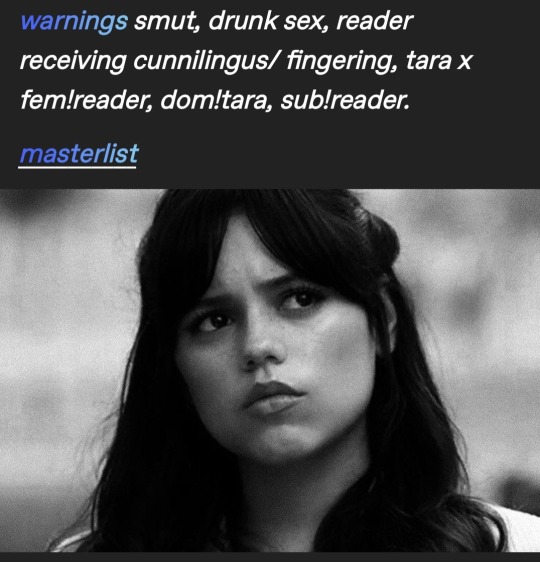
Drunk sex, huh. Whatever happened to "drunk people can't consent", or is that only for RL het relationships?
But I digress, as I am wont to do.
3. They certainly had Jenna’s input on the book
LMAO Okay, that's the funniest thing you've said so far, and clearly you have this strange idea that actors especially busy as fuck ones like Jenna Ortega have input on how their characters are portrayed in adjacent media that the parent company puts out.
If that's the case, then I have some stern ass words for Gillian fucking Anderson and that horrid X-Files novelization I read years back. Ooo, maybe I should've griped to Marina Sirtis about the boring Imzadi Trikerfest (Riker/Troi, and technically not a novelization) as well, since I've been a Trorfer for almost 30 years.
OH WAIT. I DID.

Told her that despite Triker's existence, I'm a Trorfer for life, hence her laughter.
Psst: They're actors. They don't have input in the adjacent material the studio releases, but you can continue to delude yourself into thinking that they do.
IF Ortega had input in this, I'd be surprised, and would have words for her, too. But given how she's responded about Wenclair (+ Wednesday as a character) and how, instead of capitulating to your guys' desperate desires and fantasies, she's decided to just kill any romance for Wednesday Addams going forward, I don't think that she has.
Im not sure if you realize that or you just want to be nit-picky about it, Wednesday’s character is portrayed pretty well in the absence of her mind, she is not some psychopath the people think she is; that is the FANDOM Wednesday Addams.
That's a bit ass-backwards.
NC Wednesday very much has psychopathic tendencies and traits. She is also very much canonically a narcissist who doesn't DO feelings normally.
I mean...did you think that all people with psychopathic traits ARE psychopaths? You'd be wrong.
Mejia's Wednesday is fandom's Wednesday, as far as all of the little weird interjections of softness that are in there. NCW didn't give a flying fuck about Enid when she dragged her to the Gates Mansion. She was using her as an excuse to get there. She also didn't tell Enid to give her her damn snood to tie them together against the dumbwaiter door (🤦🏽♂️🤦🏽♂️🤦🏽♂️) when Hyde!Tyler was attacking. That's a change to canon based on fanon.
Your little Wenclair brain's so soaked with fandom crap that you can't even see how any of this diminishes Wednesday's growth towards truly being able to express feeling towards someone she cares about, i.e. accepting the Hug. Mejia even fucked up (re-wrote) the hug itself:


NC Wednesday DID push Enid back — at first.
youtube
But it was the moment that Wends looked into Enid's eyes and knowing what support they both needed in the relief of that moment, brought her into THE Hug. The Hug was a "thank God you're alive", "thank you", and "we did it", but it was also the point where Wednesday was finally able to let herself express that kind of emotion in front of others (hence the music and the cheesy camera pan around the other students who knew them).
Being heavily involved in your 30s with a illegal ship in itself is weird too, that in itself is more delusional than liking a “fandom version” of a character.
Oh my GOD can we just stop with the crap about "illegal ships"? This is fucking FICTION. I could've set Afterburn in a world where the Age of Consent is 16 and no one bats an eye (like in House of the Dragon...only that's worse, since Helaena had her first incest kid at 13 or 14), but I haven't because I'm trying to respect the canon that we see on screen. My readers will see how that's dealt with, but it was my choice to write within the constraints of reality (I didn't have to).
That said, Afterburn Wednesday IS a "fandom version" of Wednesday. And I like her better than Mejia's hot mess of a Wednesday who doesn't even fucking know that you shouldn't take a knife out of a stab wound to the gut

What a fucking moron.
4. The novelization remark is ultimately untrue;
What'd I say about it?
4. Novelizations should always be written by someone who is unbiased, knows the show, and can handle uncomfortable dialogue. If you know this author's other works, you can clearly see why we got what we got in terms of Wednesday's soft Wenclairian thoughts throughout the whole damn thing, but as far as knowing the show? What excuse do you or they have for "Crackstone Crypt"? Or stretching Outreach DAY (singular) into two days? Or screwing up the timeline on the day before the Rave'N? Or deleting so. Many. Lines. And Easter eggs that made Wednesday part of Addams Family lore.
How is any of that fucking ultimately untrue? So you WANT someone biased, who doesn't know the show, and who doesn't know how to handle uncomfortable dialogue? You WANT someone to delete the best canon Wenclair lines? Of course you do, since you value what they were exchanged for more than you value actual canon.
Wasn't just Wenclair lines they messed with. Don't even get me started about how the dude changed the phrase "slave to technology" to something more politically correct, something that does not roll off the tongue the way it did when both Ortega and Doohan spoke their lines.
But please, tell me more about how TV-to-novelizations work since you know so well. I'm sure you've read more than (this) one in your entire life, right?
You forget that almost the entire cast of Wednesday ship Wednesday x Enid, are you saying that they should ultimately be replaced with an unbiased opinion?
...Why the fuck would I want the entire cast replaced because of who they ship? What the fuck kind of logic is that?
"Almost the entire cast's" shipping has no bearing on their fucking jobs. Despite the little dust storm MGM/Burton dealt with re: Ortega changing lines to suit what she thinks of the character she's portraying, it's generally unprofessional for actors to do that on the regular (which is why there was a dust storm around it). These jobs are separate and distinct (ofc, unless the actor was the writer): Writer, actor. Can they have input? Of course they can, but the example that you used? It's ridiculous. A non sequitur. Naïveté about how things work, because maybe you're just too young and too damn bubbled in your own fantasies about how life actually happens.
To quote our baby-faced babycakes from the Pride media reporter who asked: "In a perfect world, [Wenclair] would've been a thing."
In a perfect world.
Newsflash: We're not living in a perfect world. We can't live in a "perfect world" because one person's version of "perfect" isn't another's.
So we have fan fic.
And even then, you can't help but sully the lines between reality and fiction.
🤦🏽♂️
Wednesday was a show mandated for kids; Of course its gonna have a low reading level, many kids of 8-11 love the show as much as adults, it is not going to have high vocabulary and detailing you would expect it to. In season 2’s novelization; I can assure you that its not going to be as mandated for kids....
🤦🏽♂️🤦🏽♂️🤦🏽♂️🤦🏽♂️🤦🏽♂️
Tell us that you don't know what TV ratings are and that you don't know what Wednesday's TV rating is without telling us.

Fourteen is high school age. It's Middle Adolescence. Middle and late make up Young Adult, hence YA fiction.
The book should not have been written with "8 to 11-year-olds" in mind because the show, as deemed by Netflix, is intended for audiences 14 and up:
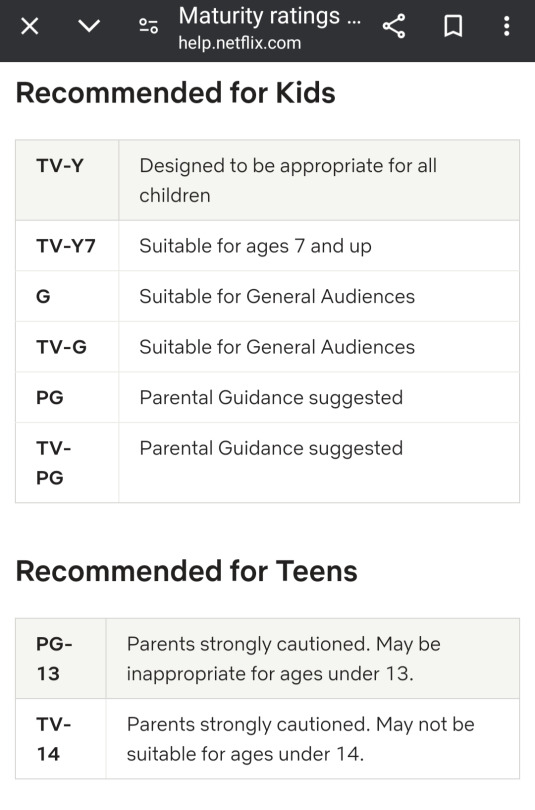
I agree with the rating, especially since there were some very adult-oriented oral sex in-jokes (with the inclusion of The Cramps song and Ajax discovering Enid crouched in front of Lucas's jock) that kids won't grasp but adults will.
And speaking of ratings and readability, long before the Internet existed, there was YA. Anne of Green Gables is considered YA, even though it was written for all ages (kinda like Harry Potter). But y'all have been so damn dumbed down that it'd be considered difficult reading in comparison to this stuff and most of the modern "YA".
The first paragraph of AGG is too difficult for the bulk of today's YA crowd:
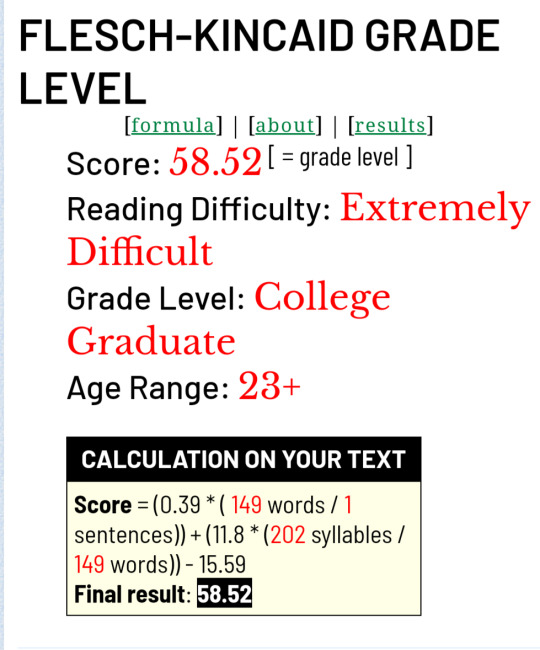
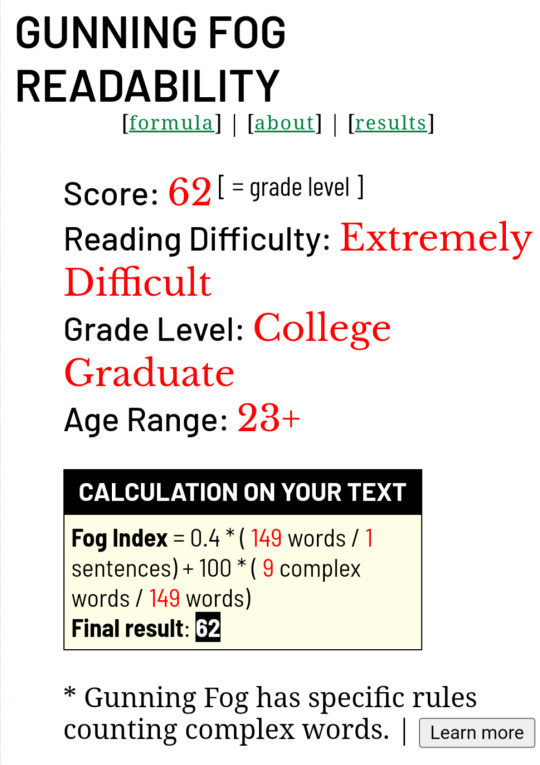
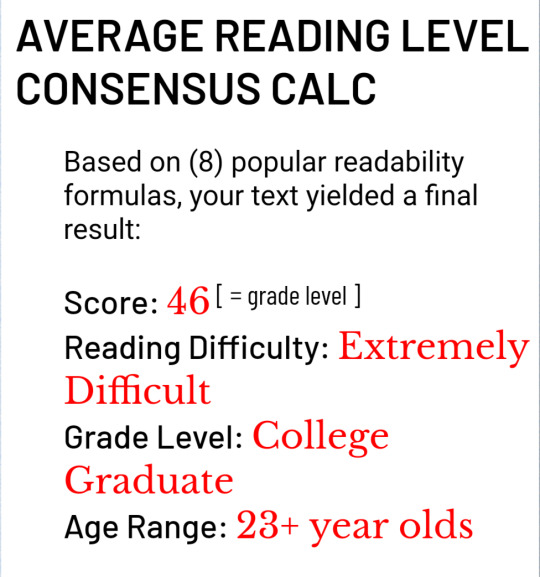
But it wouldn't be difficult if you set your minds towards learning.
You should all be expecting better of yourselves and of the YA authors you read. Stop scrolling and read more classics. Taken as a whole, this novelization is crap compared to what you could be reading to expand your mind.
Now if you'll excuse me, I have to wade through the Hell of the comments sections that this shithole has given us to find where others have continued to scream at me about this damn post.
So apparently, @netflix allowed this Wenclair terrible fanfiction to be published as some kind of novelization for season 1 of the Wednesday series...
Even though it has almost nothing to do with the @wednesdaynetflix series 🤦♀️
I mean... how are you going to make Wednesday attracted to Enid in this book when she was canonically attracted to Xavier and Tyler? 🤦♀️
Enid being excited when Wednesday told her that she was going to the dance with Xavier...
Enid dating Ajax and kissing him?
Wednesday almost kissing Tyler after their date?
Then Enid sending Wednesday to kiss Tyler at the weathervane?
All of this actually happened in the show that we watched! 🙄
What part of this makes us feel like Enid and Wednesday have romantic or sexual feelings for each other?
@Netflix Do you think we're stupid? Or are you trying to gaslight us🤔?
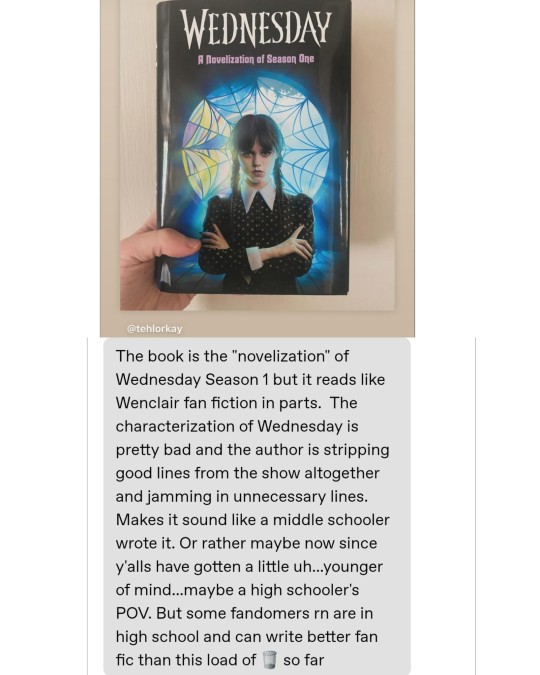
#wednesday novel#wednesday novelization#wenclair#the great wenclair explosion of 2024#and the wars to come#lol#whatever#wednesday#wednesday addams#jenna ortega#writing wednesday#on writing#on novelizations#ya fiction#enid sinclair#emma myers#character integrity#canon#canon vs fanon#fan fiction#satisfying afterburn#wenovan#black bubblegum#sheriff galpin#wednesday netflix#netflix wednesday#tv ratings#you damn kids#give me a headache#get off my lawn or i'll hose ya 👴🏽🔥
133 notes
·
View notes
Text
Red Wings of Temperance
A Possible Influence Behind the Color of Hawks’ Wings
A deck of tarot cards is made up of 78 cards, and the first twenty two are known as the Major Arcana. They were created in the 14th or 15th century but were not used for divination purposes until the 18th century. Tarot card readings are not meant to predict the future but to offer spiritual guidance.
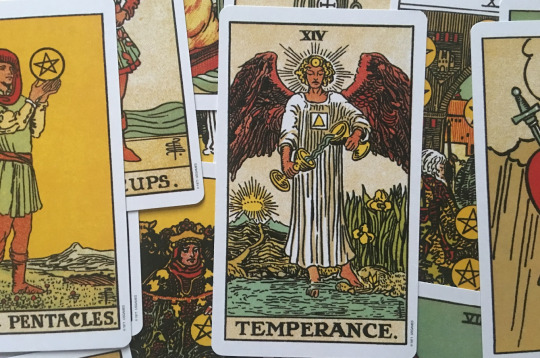
The image above (from Oracloo) depicts the 14th Major Arcana card in the tarot deck which is known as: XIV Temperance.
Like me, I’m sure that your mind jumped to a certain pro hero as soon as you saw the figure’s red wings.
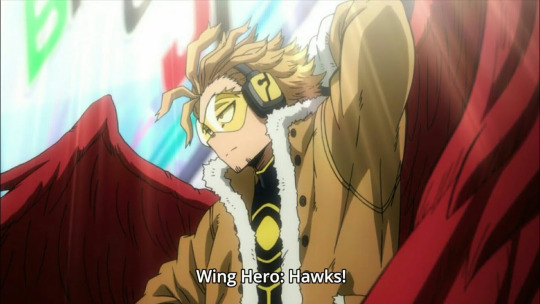
What might Temperance have to do with Hawks? Let’s first look at a couple definitions of the word first. According to Merriam-Webster:
Temperance
1. moderation in action, thought, or feeling
2. habitual moderation in the indulgence of the appetites or passions
If Temperance is drawn, it means:
Balance, patience, and moderation in life.
To think before we act. To look at both sides of an issue, to walk in another’s shoes or their path before we pass judgement. To be compassionate, considerate and fair in our dealings with others (bluestartarot).
That you have a clear, long-term vision of what you want to achieve. You are not rushing things along; instead, you are taking your time to ensuer that you do the best job you can. You know you need a moderate, guided appraoch to reach your goals (biddytarot).
Other Red-Winged Figures
Before we begin I’m going to point out that there are a couple other Red-Winged figures amongst the Major Arcana.
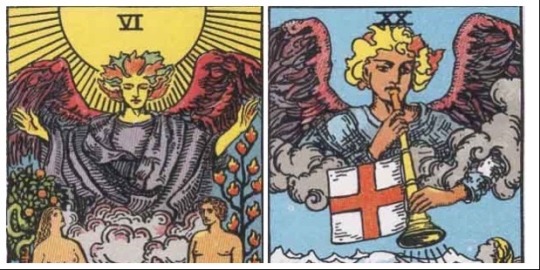
I’m not aware if nudity in art is allowed on Tumblr so just to be safe, I cut the bottom half of both these cards because they depict nude individuals.
The tarot card on the right is VI The Lovers and XX Judgement. Out of the two, I think you could perhaps make some connections with Judgement and Hawks but I think that Temperance works the best.
Symbols of the 14th Arcana
There are quite a few symbols on XIV Temperance, but I’m going to focus on a select few. Interpretations may differ based on the source but I tried to stick with those that were repeated throughout the different websites I read through.
The most important part of this card is the act of pouring water from one cup to another, signifying a balance of duality and a mixture of two separate objects. This is where the card gets its name, the process is called “tempering” which is a slow process to eventually find a perfect middle ground (wemystic).
Other dualities that is represented on this card can be: male/female, spiritual/physical, emotion/logic, conscious/subconscious and subconscious/superconscious (we mystic).
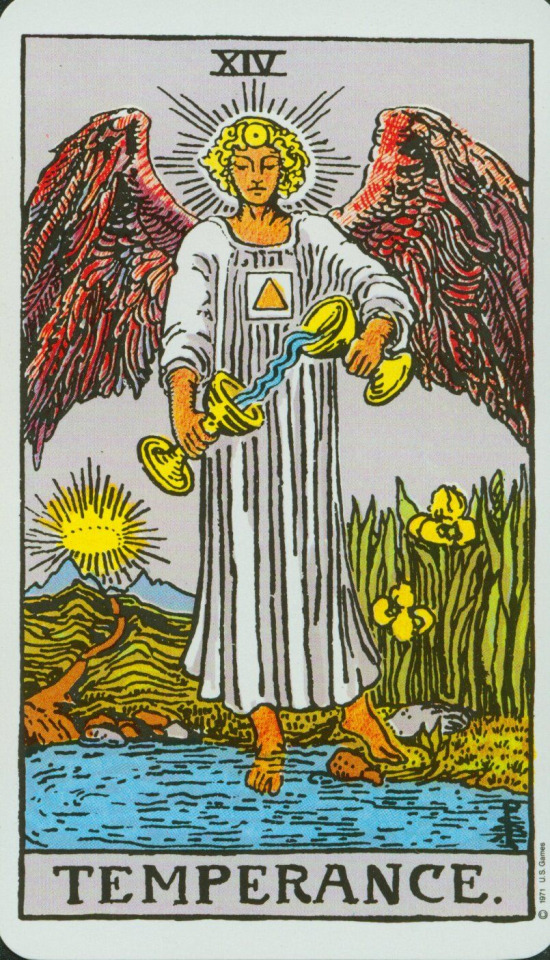
Temperance revolves around supreme balance. One foot is on land which represents the Earthly, material world and the other is in water, which represents the emotional, subconscious world.
The winding path leading to the mountains represents the journey through life with its twists and turns. The sun, appearing as a glowing light is a symbol of staying true to one’s life purpose and meaning (biddytarot).
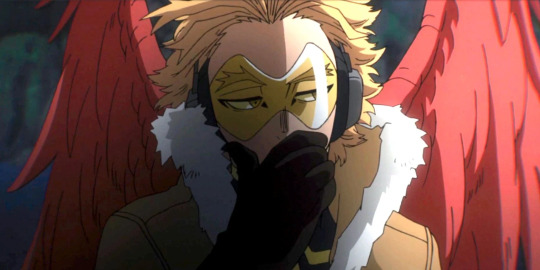
Fire/Red wings: Physical passion, anger. Muscles and strength necessary to maintain composure and reach a higher being state.
Blue water: Emotions, peace, calm. Groundness and refreshment.
White gown: Pure thought.
Yellow Iris: Communication, thoughts, learning, feminine/masculine.
Temperance’s wings are either referred to as “fire wings” or “red wings.” If we want to make connections to we can argue that his Fierce Wings Quirk is the source of his physical strength, even though he displays some insecurity about his back not being “reassuring” enough for others to depend on.
Other than his red wings, I don’t think I’m confident enough to draw a clear connection between his appearance and the other prominent colors that appear on Temperance. Hawks’ visor was blue before the anime chose yellow, and he does have the yellow color palette going on.
However, the meanings of the colors do line up with Hawks’ character. He is a character who is always trying to be calm and collected no matter the situation. Hawks is a character who is constantly seeking, taking in, gathering, and analyzing information. According to the fandom website, Hawks’ surname translates as: “hawk” (taka 鷹) + “see, visible, idea” (mi 見 )
While his first name translates as: “disclose, open, say” (kei 啓) + “enlightenment, understanding” (go 悟).
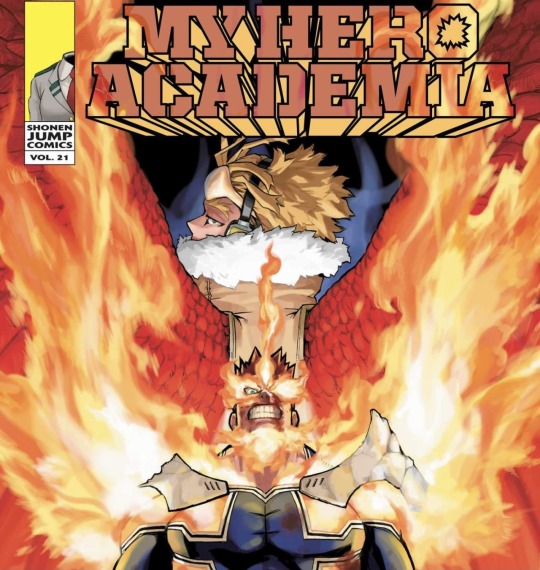
Sun: Also appearing as the angel’s third eye, it represents the merging of personal aims with the universe’s plans for the individual.
So similar to many others, I like to see Endeavor as the sun to Hawks’ Icarus (side note: I also like to see Dabi as Apollo in the Icarus theme).
The bit about the eye is interesting as well: I believe that eyes play an important role in the story telling with Hawks, Endeavor and other characters. There are interesting similarities between the two characters and the Egyptian Gods Ra and Horus (@/bokunowtv also pointed out some interesting details as well).
Recently, it also seems like Hawks’ storyline will be intertwining with Endeavor’s. Hawks has expressed verbally in Chapter 299: “Starting with my origin, so to speak... Endeavor’s in trouble.” While they did team up professionally as heroes in the past, it seems that Hawks intentions this time will be personal. We have yet to see what he is planning to do and how things might pan out, however this path will probably lead him to Touya.
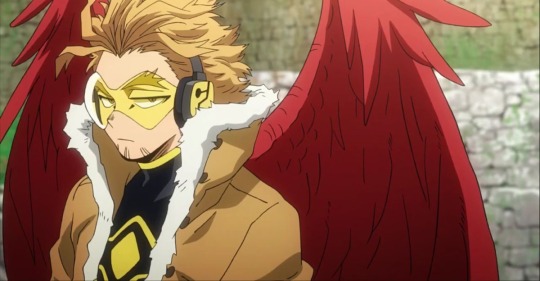
Triangle: Representative of the fire element and holy trinity.
Although Hawks does not wear a triangle or square on his chest like the angel, it is still interesting to note that he wears the Hero Public Safety Commission’s diamond symbol in about the same place. Again, there is the mention of fire again.
The Angel
Because Temperance has to do with balance and duality, the angel on the card is both masculine and feminine.
Whether they are just an unnamed angel or a Biblical angel depends on the source you are looking at. However when it comes to identifying them, while one states that it is the Archangel Gabriel, the sources I looked at overwhelmingly pointed towards the Archangel Michael.
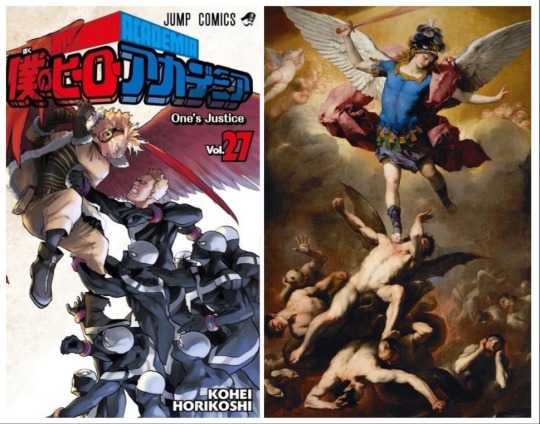
This is very, very interesting considering that the Archangel Michael is the angel who is in all the paintings that people were comparing the cover of Volume 27 with, specifically the painting above: “The Fall of the Rebel Angels” by Luca Giordano.
My analysis first post on Tumblr had to do with pointing out similarities between the Archangel Michael and Hawks, and what that could mean. And my most recent post revisits the possible angel narrative which may be present in Hawks’ story, and how he is referred to as a “fallen angel.”
It’s exciting to see the Archangel Michael pop up again. Michael was also God’s angel of destruction and on XIV Temperance we see him tempering or blending his passionate anger with consicious thought to blend his fiery nature with his super-consciousness with calm (blustartarot).
Temperance Reversed
When Tarot cards are reversed, their definitions are flipped over.
When XIV Temperance meets XV The Devil we see imbalance, disharmony, indifference and lack of empathy. When we preactice excess in our lives without moderation and balance whether it be food, alcohol, drugs, and relationships, we lose ourselves in addiction and bondage (bluestartarot).
May call for a period of self-evaluation in which you can re-examine your life priorities. Self-healing: by creating more balance and moderation in your life (biddytarot).
We’ve seen Hawks indulge in something or trip up a couple of times. In Chapter 186, Hawks asks if he can have Endeavor’s leftover food and Endeavor calls him a glutton. Additionally, @/scarletrain1724 has done some analysis on how Hawks is a character who is often seen around or consuming food.
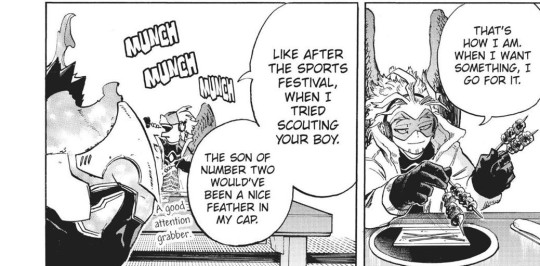
And in Chapter 265, Hawks takes Jin’s life. As Dabi states below, “sentiments” tripped him up. Hawks displays a lack of empathy here. He believes that he feels sorry for Jin and wants to help him, but Hawks is actually unable to understand him properly. I would also identify this action as one of Hawks’ narrative Icarus falls.
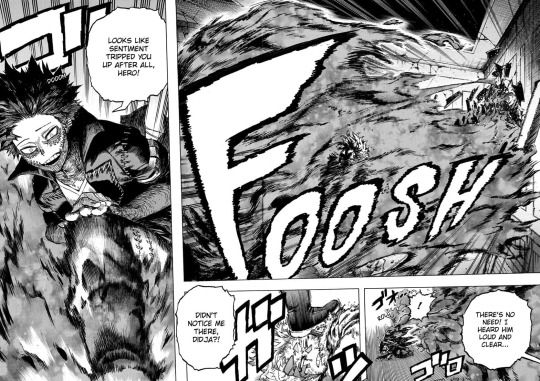
The Moral of Icarus’ Fall
This all ties in nicely as we see Hawks’ character following an Icarus narrative. There are a handful of “morals” that we the reader are supposed to gain from the Fall of Icarus but I’ll pull an excerpt from the part I’d like to focus on.
Before taking flight, Daedalus warned his son:
“Take care to fly halfway between the sun and the sea. If you fly too high, the sun’s heat will melt the wax that bids your wings. If you fly too low, the sea’s mist will dampen the feathers that give you life. Instead, aim for the middle course and avoid extremes.” (The Fall of Icarus - adapted from Metamorphoses by Ovid)
As we all know, Icarus does not heed his father’s warning, whether it be cause he purposely ignored him or forgot and flies up towards the sun. The sun’s heat melts the wax and loosens the feathers on his manmade wings, and he plummets in to the ocean below, drowning.
Avoid extremes, fly in the middle and seek temperance.
The card that comes before Temperance is XIII Death.
In death we go through transition, a rebirth, changes and with these we come to XIV Temperance for the need to take the time to pause and think. To integrate and blend what we have learned on our journey (bluestartarot).
So the question to ask is, has Hawks learned anything from his actions or will his story end with him drowning in the ocean?
To those who were able to make it through this post, thank you! I know that it was really long but I didn’t want to divide it into more than one part. I really appreciate your time and attention! :)
#visual#hawks#takami keigo#bnha analysis#mha analysis#mythological influences#religious influences#bnha#mha#bnha meta#mha meta#luna writes#my post
34 notes
·
View notes
Note
Rewatching volume 8 I can safely say that they kinda ruined Ironwood's character. To me they made him a cartoony villain by shooting the counsel guy and teaming up with Watts at the start of the volume, as well as him willing to blow up mantle even though Salem was gone. I think they should have taken their time in the volume making Ironwood a villain, Judgemental critter explains how he could have been better in her review. Buuut that's just my opinion
Then I figure you don’t mind if I go into Judgmental Critter’s Ironwood part?
‘Ironwood is an interestingly complex character, both kind and understanding but also stern and harsh.’
... That’s...not unique. Like, at all. That’s like every Sink or Swim Mentor or Stern Father figure. Fuck, Hank Hill came to mind.
‘He was the one who broke the news to Yang, being earnest and disappointed that yang was disqualified. But also put his foot down so there’s no protest from the girls.’
... So? This isn’t the aspect of him that Volumes 7 and 8 are being focused on and this is BEFORE his paranoia and trust issues got validated so of course he’s in a naturally better state.
‘Here’s a man who convinced himself that he built an army that couldn’t be beat.’
Wait, did you just...skip the part where he relates to Yang and implies he has PTSD, indicating he’s not exactly mentally well? ... What the fuck?
And you’d better be considering this when you come to Volume 8, after his army has been beaten and just got stretched thin.
‘In Volume 4, he stands kindly by Weiss’ side, stands up for her against the Atlas elite and when the girls meet him again-’
... *graps Judgmental Critter by the collar as they pass by.* Don’t think I didn’t notice that.
Jacques: You've never trusted anyone other than yourself!
Ironwood: (shouting) And for good reason!
Weiss covers her mouth with her hand as she gasps at the sound of Ironwood slamming his fist onto the desk.
Ironwood: If Oz had just listened to me from the start...
Jacques: You need to get a grip.
Ironwood: That's exactly what I'm doing. Our people need protection. By this time next week, the Kingdom of Atlas will be officially closing its borders. No one in; no one out. Without the council's permission.
Jacques: You mean, without your permission?
Ironwood: And if that becomes the case, I would think you'd want to be on my good side.
Funny you don’t mention this in your summary of him, considering this is portrayed as a deeply personal reveal of the man.
I also remember that you ignored what he said in Volume 2.
Glynda: Trouble sleeping?
Ironwood: (Looking back, gripping his shoulder with the other hand.) Arm was acting up.
Glynda: Of course, so logically, you got out of bed, dressed yourself completely and decided to gaze menacingly out into the distance. (Approaches all the way to his side, then looks at him concerned.) What's wrong?
Ironwood: I've trusted him for years. We both have. I just... I can't help but feel like he's keeping us in the dark.
Glynda: Don't be ridiculous! You know very well that we are not the ones in the dark.
Ironwood: (Laughs humorously.) That makes it worse! I refuse to believe that a man that I've trusted for so long would act so... passively.
Glynda: (Puts a reassuring hand on her friend's shoulder.) You're a good person, James. You've always done what you think is best for the people, even against strong protest. It's admirable. But it's high time you stopped talking about trust and started showing it. (Drops her hand as they stare into the distance together.) Ozpin has experience that the rest of us lack. And I think that's something worth remembering.
These things that connect Ironwood’s actions in the past and his actions in the future...
And you don’t mention them despite being big character moments for him? Maybe this is a coinc-
‘He knelt to spoke to Oscar, which showed his dad energy!’
... *steams starts to rise from my face*
Ironwood: Without him here to guide us, all I can do is use my best judgment.
Behind him, Oscar shifts uncomfortably. As if sensing something, Ironwood stops and looks back.
Ironwood: What is it?
Oscar: Actually, Oz isn't completely gone.
Qrow: Uh, Oscar here is… is the next Ozpin.
Ironwood: Oz?
Smiling, Ironwood quickly and eagerly approaches Oscar, who looks nervous.
Ironwood: I'm so glad you're here. I didn't think you--
Oscar puts his hands up and interrupts Ironwood, as the latter crouches to Oscar's level.
Oscar: Not quite. He's kind of, um, gone... at the moment.
Ironwood's smile fades, and he lowers his head.
That wasn’t him acting like a dad, that was Ironwood being desperate, given a fleeting glimpse of hope that the man he respected and looked to above all others is...there, standing in front of him, where he can finally have an equal again.
That was...so blatant and obvious I am finding it hard to believe you’re not doing this intentionally.
“He spoke to Oscar as if he was a trusted ally despite missing Ozpin’s words of guidance!”
Oscar. Has. Ozpin. In. Him.
Ozpin. The man that James, AGAIN, respects and follows.
No. Fucking. Shit.
“He gave Team RWBY the Huntsman title and upgrades!”
‘Huntsmen’ in Atlas meaning ‘soldiers’. And that is STILL not contradictory to what he does later.
‘He was well meaning and kind...until he found out they lied to him.”
Which was bad of them...but they were also in fault when they treated Ozpin harshly and James did WORSE so what does that tell you?
‘His PTSD comes flooding back!’
...
......
...........
You skipped how he refused to trust the council, his PEERS, with the info about Amity or even Robin, whose entire issues with him could have been solved if he TALKED to her, all because of his trust issues.
You have completely shoved his trust-related skeletons into the closest and play up his more pitiable PTSD issues. You’re fucking Mary Sueing him.
‘Was all of it Team RWBY’s fault? They didn’t give him the truth but neither did Ozpin-’
Was it Team RWBY’s fault that the Fall of Beacon or Atlas’ issues happened? No! In fact, James was more culpable in both scenarios (if he listen to Ozpin then the machines COULDN’T attack Vale citizens and if he told the truth and listened to Team RWBY before he had no choice then he could have stopped all that shit!) than them. And just as Ironwood’s issues don’t excuse Team RWBY’s fuck ups- Ozpin’s issues don’t excuse James’ fuck ups.
‘Who can he trust? How many levels of precautions does he need to take?’
You know, I’d buy this shit if not for how the depth of his trust issues isn’t actually shown, how his issues with trust went beyond this and came around to how he was isolating himself. This is still trying to play pity for the man instead of seeing him for who he is.
‘We left Ironwood last Volume as a complex man whose filled dwith grief, guilt and fear-’
And what have we seen as the end result of these emotions time and time again in RWBY?
They cause the person to devole.
Hazel is filled with grief and used that to help justify his shit actions.
Ozpin is filled with guilt and let it distance himself from others.
Yang was filled with fear and couldn’t move on.
And Salem...Salem is all fucking three and we KNOW how she turned out.
The way that ‘complex man’ is portrayed is the same way one says a character is complex as an excuse to ignore their darker issues. She goes onto portray Volume 8′s beginning with Ironwood as somehow not in line with his ‘complexness’ when this has been an issue with him since Volume 2.
And as a special fuck you to that:
Do you have any idea how tempting Ironwood’s position is? To be hurt again and again by others as you try to defer to them? To see yourself as right time and time again but still struggling to see other’s point of view as valid? To resist the temptation to discard what EVERYONE says, to not care about what others say and carve your own path regardless of what others think, feel or say?
I have. Countless times and it is SO HARD to not do what Ironwood did.
‘In his first scene, Ironwood crossed the line!’
Not really. From Ironwood’s point of view, Slate was standing in his way with Salem at his doorstep and in a worse shape than ever and he can’t afford to waste any time with him. Killing him is rather logical and why would Ironwood care? It’s right in his eyes and the morality of other people has only been chains to him.
‘This isn’t playing on his paranoia!’
Gee, what emotion is it that causes Paranoia again? ... Fear? And Ironwood did this out of what again? ... Fear of Salem?
How is it RWBY can bee so unsubtle to cause blunt force trauma on it’s audience and yet they STILL routinely fail to see it.
‘He’s just a shitty cartoon villain!’
Ah huh. Again, I heard the same about the P5 villains. And they all had real world counterpart (Madrame in particular can be compared to ROOSTER TEETH).
‘Cartoon villain’ is just a buzzword at this point.
‘His personality before was so much more intriguing!’
The personality where you chopped off the stuff that shows this coming?
Yeah headcanons tend to appear that way.
‘Everything he was just thrown away to give us a laughable shell of a character!’
AKA ‘Two Ironwoods’ right?
Newsflash- characters and people can change for the worst. People can reach this point and beyond for the same reasons as James did. Good people can devolve and change. And yet he still had his humanity. He still tried to hold back in some manner before he felt concerned even more. He never took joy in what he did. And he still cared for his people.
To call all that effort just a ‘shell’ because you BLATANTLY cannot accept this change in a character enrages me beyond what text can show!
‘He didn’t develop into a colder, heartless man-’
Yes. He. Did.
He ignored his people’s concerns and feelings just for a greater goal. He treated people as a whole instead of individuals. He kept secrets more and more. He constantly questioned if his compromises gave Salem the advantage.
He did devolve. You just blinded yourself.
‘I could see this happening!’
Right, if the show jumped through X+1 hoops right?
‘But instead-’
No fuck you, I’m done.
God what is with these twins and pissing me the fuck off?
17 notes
·
View notes
Text
Of Gods, Monsters, and Men
“Man is by nature a social animal [...] Anyone who either cannot lead the common life or is so self-sufficient as not to need to, and therefore does not partake of society, is either a beast or a god.” - Aristotle
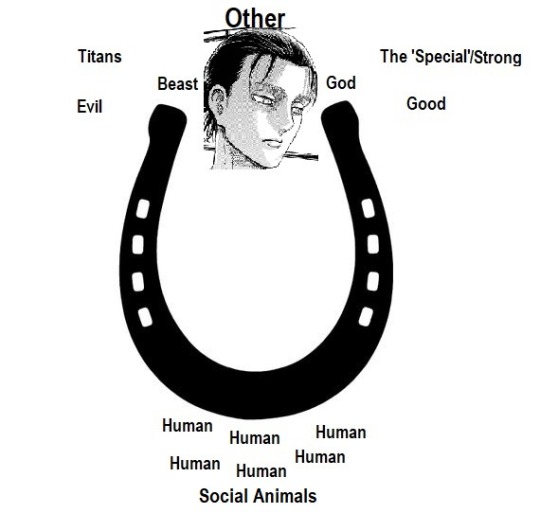
This diagram will make sense, I swear.
Part 1 - Humans, Gods, and Beasts
Aristotle’s tripartite system is profoundly embedded in the world of SNK.
Humans, the social animals, are the ordinary people who do not seek to make an individual mark on history, but instead live communal existences as cogs in a machine. The most important thing to them is usually the well-being of themselves and their loved ones.
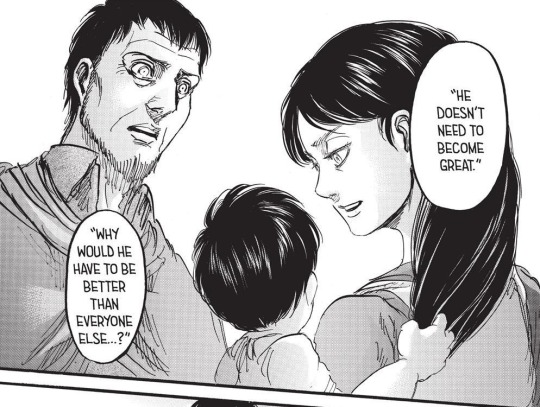
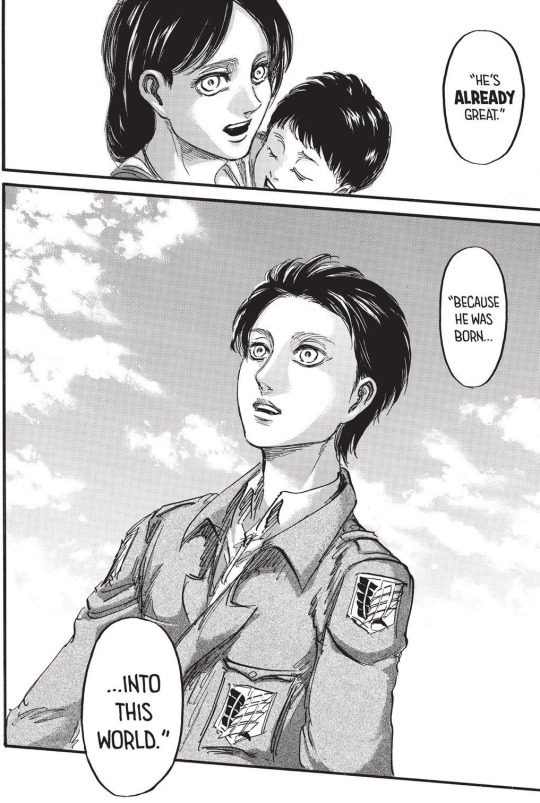
They are considered weak as they do not struggle against the flow, but these very attributes are what make them human.
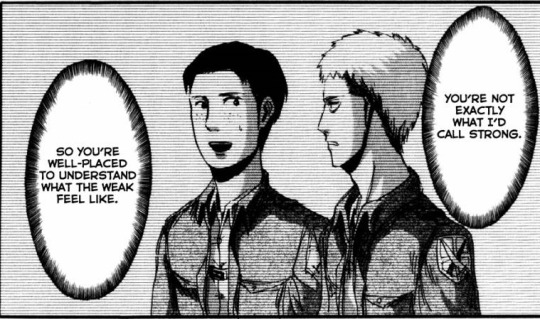
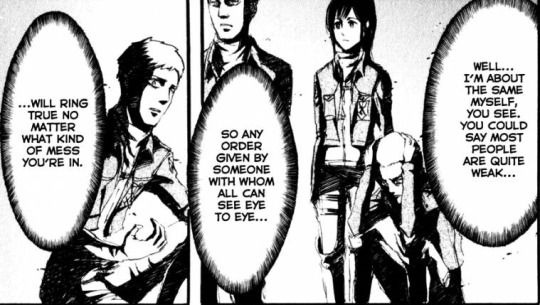
The vast majority of the human race fit into Aristotle’s definition of ‘social animals’, as that is the only way in which society can function. The existence of those ordinary humans, then, is worth preserving.
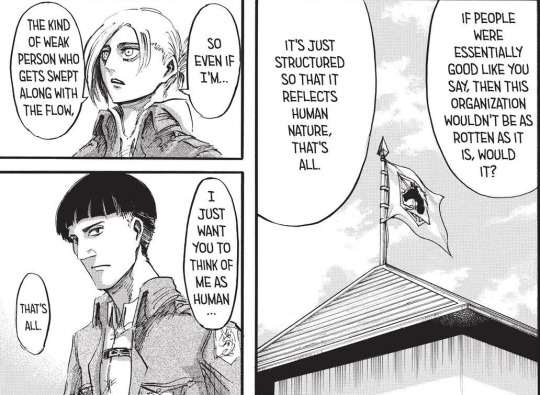
Those who are not social animals, but rather lead highly individual existences with the power to leave their own unique mark on the world, are Gods when viewed positively and Beasts when viewed negatively. Because they go against the flow and disrupt the status quo, they are demonised by those happy with that status quo and lionised by those who are not. In either scenario, they stand out from the crowd.
Gods are considered to be strong and special.


The apex of this specialness is symbolised in the series through its pseudo-Gods, like Ymir Fritz, and those with godlike powers like the Ackermans and titan shifters, especially Zeke and Eren.
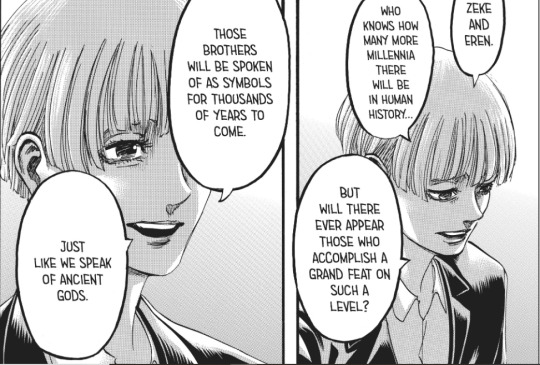
The entirety of the Eldian race, by virtue of the power to turn into titans, can also be considered special and so are lionised as gods by the Eldian nationalists.
However, they are considered Beasts by the rest of the world because of that same uniqueness. The apex of beastliness in the series is in the titans themselves, the ultimate ‘Other’. Nothing can be as estranged from the human social community as they are, as uniquely disgusting, uniquely powerful creatures.
With this tripartite system established, however, the series deliberately complicates all three of its boundaries. To begin with, let us examine the disintegration of the boundary between Beasts and Gods.
Part 2 - The ‘Other’
Beasts and Gods are ultimately the same thing - they are an ‘Other’, defined by their lack of dependence on their community and, consequently, their status outside of it. This separate status makes them an unsocial animal, and therefore, not human. Whether this inhumanity is a good thing or a bad thing - godly or beastly - is only a matter of perspective.

There is no better proof of this than the personage of Eren Jaeger.
From the start, Eren has had no desire to be a ‘social animal’. He never catered to the opinion of the populace, and held them in outright contempt.

He wanted to accomplish everything on his own, without relying on others.

He stuck to his dream of joining the Survey Corps no matter what anyone said, and won people round to his views instead of struggling to fit theirs.
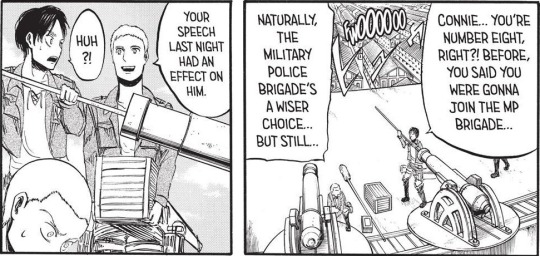
Acting this way gained Eren a reputation as either a total idiot, as in Jean’s eyes, or as an example to be followed, as Connie, Sasha and the others saw him. When Eren’s titan power was unveiled, this dichotomy escalated: where Erwin saw humanity’s greatest hope, the Military Police saw an enormous threat to peace inside the walls.
He is seen as a beast or a god, but even before his titan powers were revealed, he would never let himself be considered a nobody. The values he nurtured - independence and the strength to go against the present flow - were part of his desire to become inhuman.
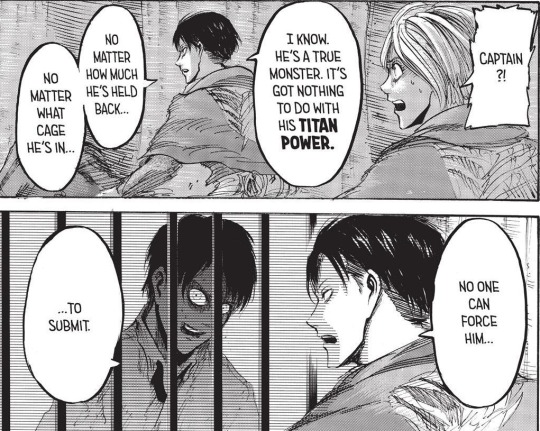
It is therefore thematically appropriate that someone so fixated on the inhuman should become a titan. In his efforts to become a god, he becomes the beast he sought to vanquish. For they are one and the same - and this goes for the titans, too. Their status as an Other, not merely as a beast, is what makes them the natural enemy of humanity.
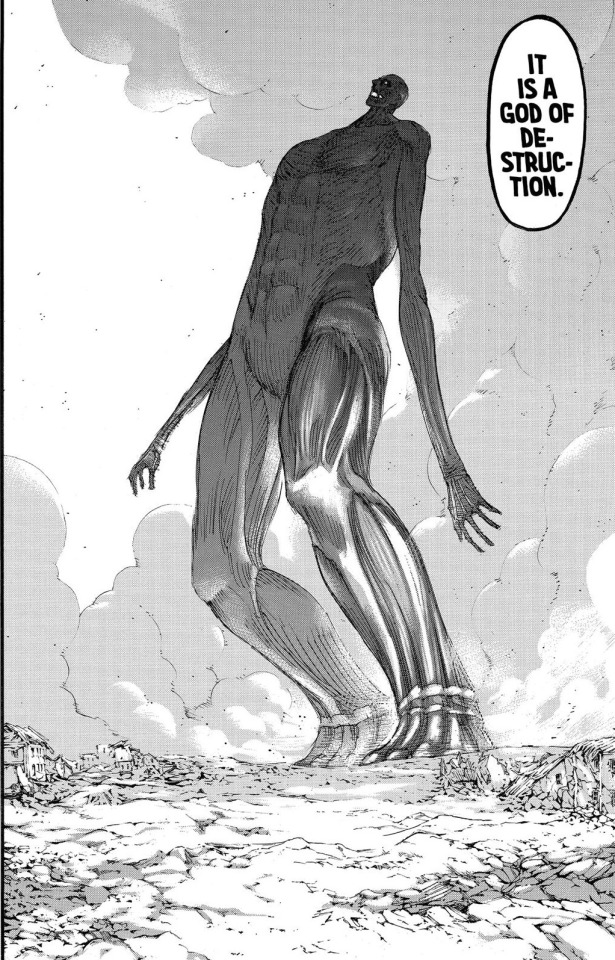
Moral doctrines that try to sort beasts from gods and drive a hard wedge between them only serve to obscure the truth.
The Church of the Walls is the best example of this exercise in futility. It reviles the titans as beasts and worships the Walls as gods for protecting them against such beasts - but the Walls themselves are titans too. The distinction between beasts and gods is thereby revealed as nothing more than a sham by the authors of public morality to keep the public in line. Indeed, how often is it the case that the devil of the new religion is the god of the old?
Like the Church of the Walls, both those who respect and revile Eren in the Final Arc observe the same truth about him in different lights: he is an Other. And they fight to the death to decide what kind of Other - a god, or a devil:

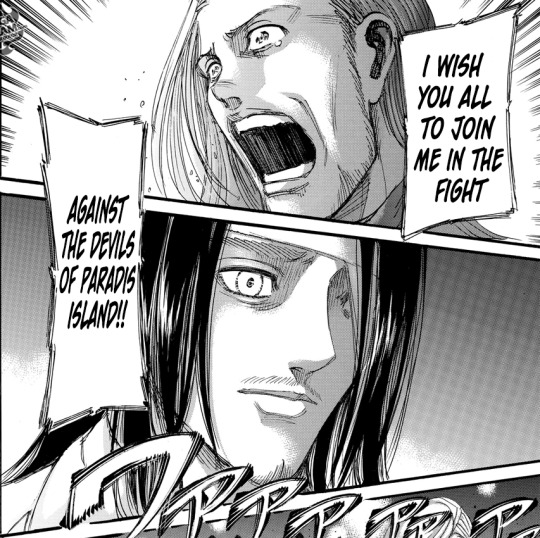
A murderer, or a messiah:
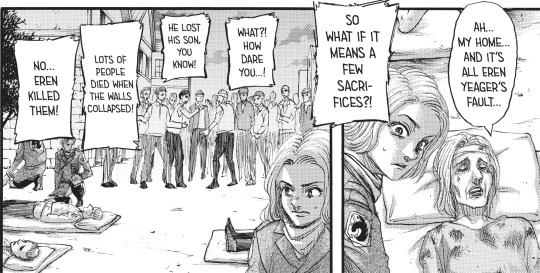
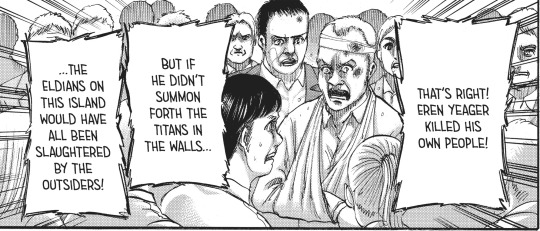
Gentle, or savage:
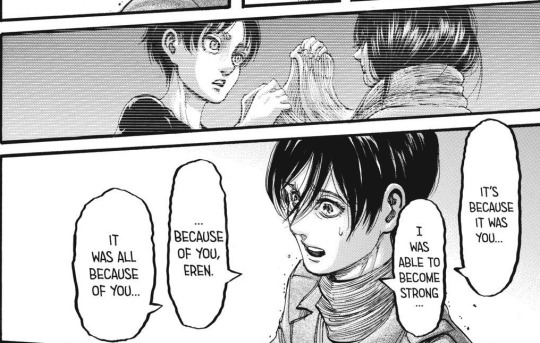
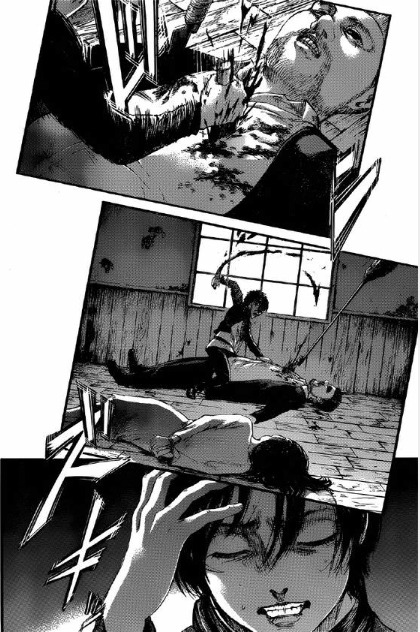
The fandom is no less divided over him than the characters are, each side assured of their rightness. He is either an incorrigible child or an enlightened superhuman, the most free or the most enslaved, unchanged or the most changed of all, a pit to be avoid or a height to which we might aspire. Eren is the circle that completes itself, both the best and the worst, a beast and a god. But whatever he is, he is nothing in between, nothing mediocre. He occupies extremes alone: that is what makes him special.
Eren is fundamental proof of the failure of our value systems. He is a thought experiment who manages to sit at both ends of the spectrum while neglecting the middle altogether. At this point, we may return to our diagram.

A horseshoe works much better than a straight line for our purposes. Eren sits between god and beast, good and evil, special and titan, but a world away from the multitude of humans at the centre of the horseshoe.
However, he was not always this way. His compulsion to move away from the herd is the same as ever, and that is likely what he means when he tells people he has never changed: but there was once a time when for all his efforts, he could not quite escape being a social animal.
The significance of this fact is monumental. Eren proves that the special and the human are not distinguished from birth, but that there is in fact a pathway between them. This leads us to our third part: the disintegration of the boundary between the Human and the Other.
Part 3 - The Philosopher
Like love, specialness is something you find when you’re not looking for it. Eren’s journey towards the special first began with his acceptance of his own normality.

Beforehand, behind his play at independence he longed for recognition and approval from others.
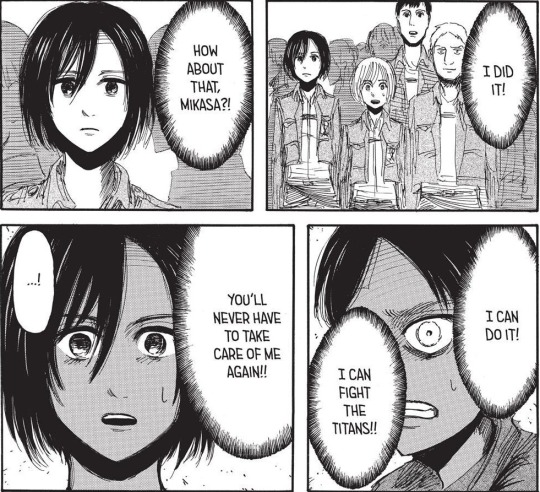
He was tired of never being taken seriously - by his neighbourhood bullies, by Mikasa, by Jean. They all dismissed him as either crazy or weak and in need of protection. He was so prone to flying out in a rage at this because they touched on his greatest insecurities - that he was really a nobody after all, and that he’d never amount to anything.
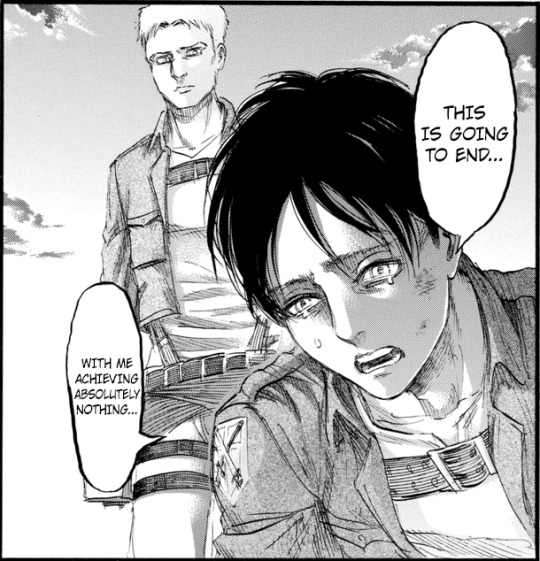
In this regard Eren had a great deal in common with Keith, who wanted above all else to prove that he was better than the rest and worthy of being admired.

This was why Keith’s story had such a big impact on Eren, and why it was placed at the end of the arc where he learns to accept being only human. One cannot become special for the sake of the approval of others. So long as you have that objective in mind, you will never be anything more than a social animal and therefore human.
It was only once Keith abandoned any hopes of being seen as special that he actually became so, when he committed the ultimate sacrifice away from the eyes of anyone living. He acted with his own conviction in his heart, and not the approval of anyone else.
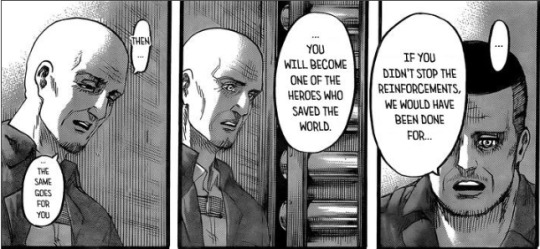
So he can finally receive the title of hero - one he clearly did not expect to hear. And it is a compliment he extends to Magath, no longer feeling the need to raise himself above anyone else.
In Eren’s case, he first learned the true virtue of self-sufficiency in the crystal cave, where he saved his friends’ lives by choosing to trust in his judgement and power over everyone else’s.
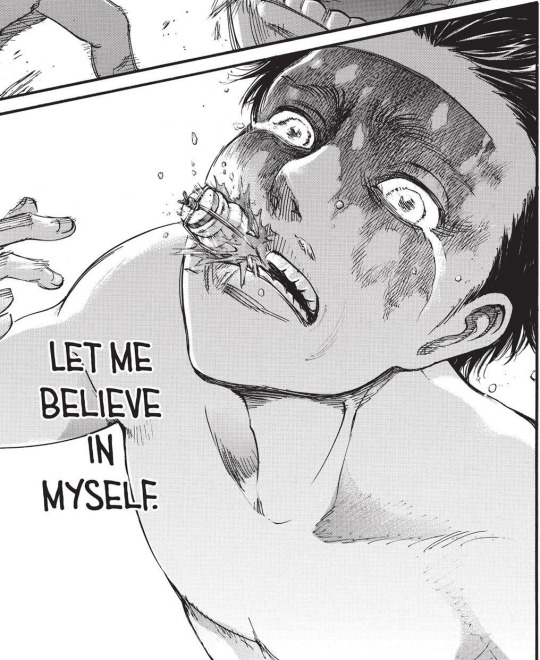
Eren is shocked after his success, and the lesson does not fully sink in at first. But such sentiments as the one below...
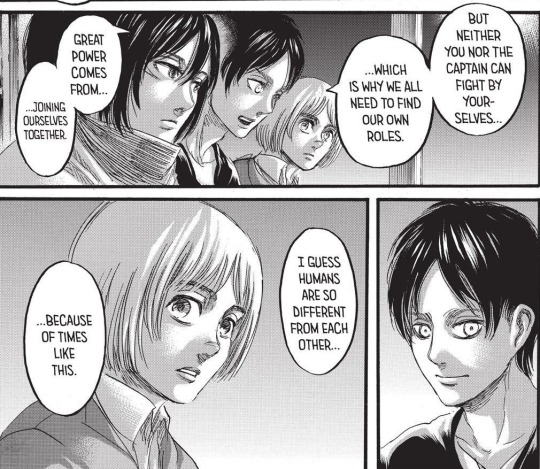
...quickly evaporate in Eren’s next moral trial, the Serumbowl. He can no longer accept peaceful co-existence between people with different beliefs because their decisions directly threaten the lives of the people he loves. This is the moment he redirects his focus to the protection of his and his own, and in doing so renounces his care for the wider world. The revelation that he will crush that outside world into ashes reinforces his belief in this conviction as the only solution.
Thereon out, Eren embraces self-sufficiency. He chooses not to trust in his comrades and builds his power to the point that he no longer needs to take orders from anyone else. Any help he does employ - from the SC or from Zeke and his followers - is achieved through manipulation, where he is firmly in control.

He becomes self-sufficient to the extent that he even moulds the conditions of his own upbringing. It cannot be said that he is a social animal any longer. His independence allows him to surpass his humanity and become both beast and god - walking on heavenly planes in the one moment and rampaging as a skeletal monstrosity the next.
Eren passes from ordinary into special through his self-sufficiency and self-orientation. This rigid self-discipline, this self-transformation, is a practice which we might call - philosophy.
Eren?
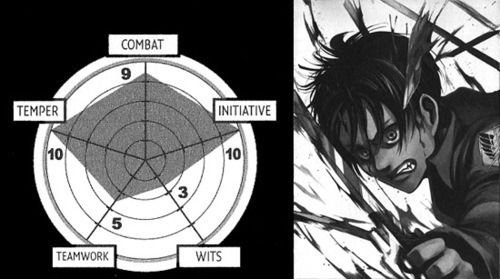
A philosopher???
Yet this is the only way a human might become a beast or god. The philosopher Friedrich Nietzsche, whose works synchronise beautifully with SNK, added one crucial modification to Aristotle’s equation:
“To live alone one must be a beast or a god, says Aristotle. Leaving out the third case: one must be both - a philosopher.”
And when one really thinks about it, is the idea of Eren as philosopher so ridiculous? Summarising a philosopher as ‘one who seeks the truth’ - who has accessed more of the truth of the world than Eren? The Attack and Founding Titans give him access to literal worlds of understanding beyond the scope of any other. And although Eren is dense at the start, he grows increasingly introverted and soul-searching as the series progresses. I think it is by no means a stretch to claim that Eren has come into his own jaded sort of wisdom.
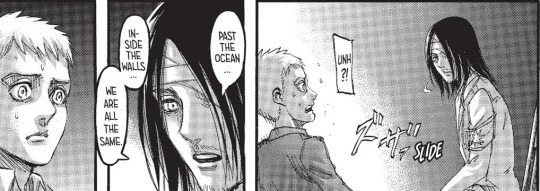
Furthermore, Eren’s restless striving for freedom, his ‘Will to Power’ in Nietzsche’s words, is so powerful that he became stronger than Mikasa could ever hope to be and hatched a plan that even Armin couldn’t predict. It is his force of will that has always allowed Eren to overcome his weaknesses. So too psychologically - his wanderlust has taken him beyond the pale of morality and so made him the series’ only real philosopher in Nietzsche’s sense of the word, as a creator of new values.
It is the drive for freedom, then, that can turn a human into a philosopher and by that means become special. The divide is that simple, that fragile. And so the monstrous Other is simply human: all too human.

Eren’s words to Ymir Fritz are the definitive illustration of this theme. Ymir, who possesses the heights of power as a pseudo-divinity, who lacks a shred of power as a slave, manages to still be human. What unites all three aspects, what allows them to co-exist, is that freedom to choose. The drive for freedom that turned Eren philosopher is what allows humans to roam into the territory of beasts and gods.

So, rather than a horseshoe, this process is best represented as a fishhook, where a pathway exists between the opposite ends of Human and Other. Through philosophy, through the discarding and creation of values, through the drive for freedom and the Will to Power, this gap can be bridged.
It is at this point we come back to the words of Eren Kruger, and consider the full weight of their meaning:

Whether an Other is a god or a beast is merely a matter of perspective - but so is the ability to become an Other in the first place. The titans of history, its movers and shakers, were not a species above and beyond. They were anyone, as human as you and me, only ones who embraced their freedom and made a courageous choice.
This is the purpose of the titans being revealed as humans. This is the purpose of the whole concept of titan shifting, where even such social animals as Reiner and Annie are elevated to the level of the special. This is the reason why mere humans are able to successfully combat the titan Others through their own skill and ingenuity. This is why our heroes possess such manifold weaknesses and flaws, to remind us that even people as average as Eren, as scrawny as Armin, and as cowardly as Jean were able to become special by choosing the Survey Corps - that is to say, by choosing freedom.
The world we inhabit is a sordid one. It’s sickening seeing the levels of cowardice people exhibit in all aspects of their lives. “I would help you, but...I would stand up to them, but...I would do something about it, but...” etc, etc, and people make excuses to run away from their problems every time. It’s enough to hate the world and everyone in it.


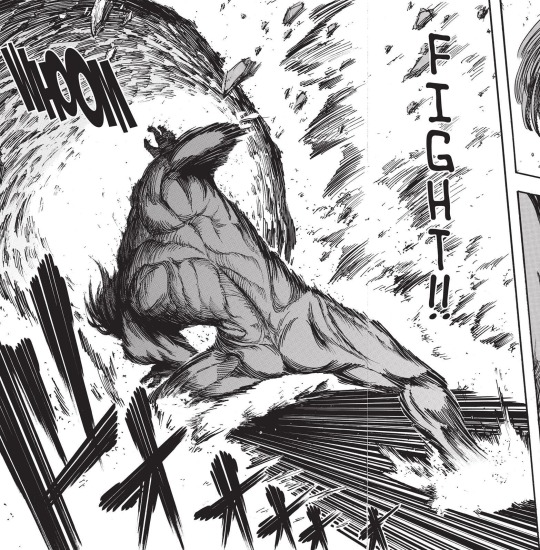
The message SNK delivers is able to restore this dwindling faith. Because no matter how disgusting human behaviour can be sometimes, in others and in ourselves, within every single human is the potential to become as beautiful as the characters we admire - to become someone special. A little bit of courage is all it takes.
That, to me, is what makes humanity worth something. Because it is through that metamorphosis into the special that we fulfil our function as human beings: creatures which have the choice to remain within their humanity or transcend it. Just possessing that potential is enough to make humanity a gorgeous species - and so, before accomplishing anything, Carla could value Eren simply for being born into this world. He doesn’t have to be better than anyone else, because it is a power we all possess.

This human potential to become both god and beast is what prevents the world from boring us to death. The beasts make it cruel, and the gods make it beautiful. And with gods and beasts being one and the same, there can be no world that is beautiful without cruelty, or cruel without beauty.
#shingeki no kyojin#snk meta#eren jaeger#eren yeager#friedrich nietzsche#aristotle#keith shadis#carla jaeger#reiner braun#annie leonhart#eren kruger
97 notes
·
View notes
Note
*vague high pitched noises in the direction of you OG!Elias hot takes*
I love them, if you have any more pls share.
Also; OG!Elias & Jonah friendship/relationship any more thoughts on that???
Ahhh thank you very much!! I Am Not Immune To The Inherent Intimacy Of Bodysharing. I’ve rambled a bit about them here but I always have more thoughts :)
(Okay this took me FOREVER to get to I’m so sorry—the sleep deficit I’ve been running on the week has been insane and the words just didn’t want to word.)
I have a whole backstory for ogElias that lives in my head, and is completely not based in anything canonical, but anyway:
I know that Jonah probably just picks who’s most convenient at the time but Elias accidentally had to go and embody one of my deepest fears and I can’t just let that go so In My Head Jonah picks Elias initially because he’s perfectly suited to the Eye. He’s from a large old family that Jonah actually looks into carefully just in case they’re secretly Lukas-adjacent because they’re just kind of awful. (He might court the Lonely but he’s careful not to invite it in too far—he knows he’s not invulnerable to it.)
But no, the Bouchards are just what they appear to be—a family with too much money and self-importance and history to make up for what they lack in character, and who have as a result become obsessed with public optics, to the detriment of their children. Pulling off the semblance of being a stable, socially presentable family is far more important to them than actual connections, and so Elias and his siblings grow up under the oppressive eye of their parents, who are always scrutinizing how they act, speak, dress, etc. to preserve their public image. Predictably this is hell on everyone involved, but where Elias’s siblings manage to scrape together either the will to pretend or actually absorbing the philosophy, Elias is the family disappointment. Okay so in my head he’s trans, but really there are any number of things that would earn the disappointment of a family obsessed w/ optics. I imagine them as being the unfortunately gaslighty kinds of people who are always going on about how he should just act the way they want him to because ‘they know who he really is better than he does’ or some awfulness like that.
So from this he’s had to actually cultivate a very strongly self-protective sense of identity. He’s going to be him, and he’ll fight to the death to preserve his individuality against a lot of pressure to conform. But on the flipside of that, he’s actually not in a very good place because while he’s cultivated a very definitive self image, he’s terrified of letting anyone actually get close enough to see the real him through the image because the constant judgement has worn on him to the point that he doesn’t want to let anyone have the leverage of being able to dismiss or attack his sense of self.
So this is the perfect combination of traits for Jonah’s purposes—Elias is isolated, terrified of being seen because that makes him vulnerable and equally terrified of not being seen/having his selfhood acknowledged.
What Jonah utterly fails to take into account is just how well they’re suited to each other. Because both of them are incredibly self-protective people but in different directions—Jonah’s willing to sacrifice his identity in order to preserve his life, and Elias is the sort of person who would wouldn’t care about dying if he could be guaranteed an honest eulogy. So in a certain sense they share enough of a personality type and sort of survivalist mentality to fundamentally understand each other, even when they hate each other. Furthermore, Elias is so used to having to defend himself against assaults on his basic sense of self that he’s actually quite resilient in that regard, and though watching his life be stolen without anyone even noticing is literally his most primal terror, Jonah can’t just shove him to the back of their headspace and forget about him, or whatever he’s done with previous hosts. In a sense, Elias has the one rebellion left to him of choosing to remain himself after all of the rest of his choices are taken from him, and this is also partially why he ‘forgets’ to be angry at Jonah—because in a certain sense it’s an assertion of his personality to purposefully maintain all of the parts of himself, and not just what’s filtered through his fear and anger.
Usually when Jonah monologues at his hosts it’s for the purpose of torturing them, but unfortunately he finds that he actually? Enjoys Elias’s company when Elias is forgetting to be angry? And it’s about the most secure relationship he can possibly cultivate because he has total control of the situation, so he lets himself start to like Elias, in the same sort of resigned way that Elias starts to like him. For Elias, his choices have suddenly been narrowed down to nearly none, so he may as well make the best of an objectively awful situation. For Jonah, Elias is absolutely ‘safe’ because he’s powerless to affect the world in any meaningful way, so Jonah may as well indulge himself in all of the socialization he’s missed since his original body. (He has such a wide network of friends and acquaintances in the 1800s that he must be a people person.)
I think that under the right circumstances they could influence each other in positive ways—Elias could make Jonah a little less self-destructive, and having Jonah’s attention and regard would allow Elias to relax his guardedness. So in a sense they both make each other care a little more about the aspects of life that they’ve decided are disposable/unimportant to their survival by seeing those aspects through the other’s eyes, so to speak. This allows them both to actually start enjoying more things about life—Elias wants to know who Jonah is as a person and is disappointed when he finds out that Jonah doesn’t seem to put much thought or effort into himself, and Jonah’s adamant desire to not die starts to infect Elias a little with a willingness to adapt in order to survive, at which point he really starts to examine what he wants out of this relationship.
Unfortunately, this is where the inherent power imbalance rears its head, because if Jonah genuinely starts to care about Elias as a person he’s going to realise just how permanently he fucked their relationship from the start. Quite apart from the whole body-snatching thing, they can’t get the space from each other or the autonomy that a partnership of equals demands, and of course they can’t have a partnership of equals because Jonah’s got literal supernatural powers and centuries of age on Elias and is also effectively his jailer. Whether he can or cannot cede any physical autonomy to Elias if he wants, he also has to choose how much influence he allows Elias to have over him as a person and in terms of decisions.
I think by this point Elias knows absolutely everything about the Mass Ritual, because Jonah overshares because he’s socially starved and also because the Eye likes it, so the way I see it is on one extreme, Elias takes a definitive moral stand and they end up in a really yearn-y relationship where they’re always together but can’t really be together, or on the other he just says fuck it and decides to be evil, too, partially as a way of asserting control over his situation, and they end up being extremely codependent. (And of course any mixture of the two.)
But in particular, because I’m a massive fan of Elias killing Jonah, I like the former scenario because he’d do it if he got the opportunity but it would hurt, but he’d have to because I think that no matter what, if Jonah had complete control, he’d never give that up or turn aside from his immortality quest, in love or not.
More miscellany:
-I like the idea of Elias being the one who’s got the methodical/logical way of thinking, vs Jonah as the imaginative/intuitive one. Jonah’s got his moments of high drama despite the bland bureaucrat persona, and I like the idea of Elias as working as a file clerk on purpose because he likes paperwork and organisation and he could not care less about the degree that his family made him go and get.
(Original post of takes here )
#wow I’m so sorry this took so long!#(also forgive the run-on sentences and the blatant projecting)#long post#og!elias
16 notes
·
View notes
Text
Black Water Arc: War of The Water Tyrants.
“Wind’s ontology refuses to take separateness as an inherent feature of the world. […] And this is, in part, wind’s value—it has an existential precondition that appears only in the context of contact. Wind is touching, mutual, moving.”
— Cymene Howe, Ecologics
It seems overly contradictory to start a piece about water tyrants with a quote about the wind, doesn’t it? In actuality, readers of the novel would find this comparison immensely appropriate. This is because although black water arc is about the head-to-head battle between Shi Wudu and Hexuan; the center point, the cause and the final effect of this whole arc is Shi Qingxuan.
“Existential Precondition” or fate. It is ironic that wind is described as such because that is essentially Shi Qingxuan’s inherent problem and “Refuses to take separateness” was Shi Qingxuan’s ultimate solution.
Short Summary:
The infant Shi Qingxuan has a curse placed upon them. The curse prophesied a life full of unfathomable hardships for Shi Qingxuan and that is now their fate. Their brother, Shi Wudu, who is extremely protective of his sibling, is bent on saving Shi Qingxuan from this curse. Shi Wudu being naturally gifted eventually ascends as a god, he uses his position in the heavenly realm to then help his younger brother ascend to godhood as well. It is eventually revealed that Shi Wudu secretly changed his sibling’s cursed fate with another person of similar name and better fortune.
The person in question is Hexuan. Hexuan was fated to live a prosperous life and ascend as a god but instead lives with tragedy latched onto him. He goes through poverty, false accusations, abuse and all of his loved ones die under heartbreaking circumstances. Hexuan eventually dies and returns as a vengeful ghost bent on punishing the one that had wronged him. Hexuan wants justice and since the gods refuse to pass judgement, he decides to come to a verdict on his own. In short, that is what black water arc is about: Judgement. In a grey situation, where exactly do we place the blame?
On Morality:
Shi wudu verses Hexuan, ‘The war of the water tyrants’ dilemma, is one of the most mind-blowingly well thought out cases of grey morality in literature. It is no secret that the reductiveness of morals into “good” and “evil” categories is one of mxtx's main themes often explored heavily in her previous works. The author rejects the absolute extremes in character viewpoints, both in her protagonists and antagonists and applies the concept in varying thoughts including race and politics.
The difference in this arc however, is the projection of the audience’s principles into each character. That is, between Hexuan and Shi wudu, she never specifies who the antagonist is. It is left to the readers to explore, reflect and come to an understanding on what exactly it is like to venture into the grey zone. Neither of the two were selfishly driven, none of their initial intentions stemmed from hatred. It was familial love that drove them to hurt one another, familial love that blindsided them. In their quest to protect and to avenge their family, innocent family members lost their lives or were hurt; on both their parts. This is where the definitions of victims and perpetrators get skewed. It is so skewed in fact, that the only valid testimony left is the reader's sentiments for the characters and their own self-principles.
From Shi wudu’s “Everything I have today, I fought for myself... I will change fate that I do not possess. My fate is up to me and not the heavens” is the will to fight predestination. Verses, Hexuan’s “What right did he have to suck another’s blood, trample another’s bones to reach the skies, and still maintain a peace of mind. Enjoying all such luxuries without any sense of burden?” the victim of the change in predestination. Two strong, commendable principles, founded by righteousness but blinded by arrogance and hatred. Later, to maintain a peace of mind, Hexuan tramples on Shi Qingxuan and in the process of fighting for oneself, Shi Wudu ultimately changes Shi Qingxuan’s fate for the worse.
We even witness the Shi Wudu’s blindness take a terrible turn at the very end when he attempts to strangle his own sibling that he fought to protect all this time. His belief that Shi Qingxuan will not be safe without him, his lack of trust in his own brother, is part of his arrogance.
In return, we see Hexuan’s blind hatred falter for a moment when he keeps giving Shi Qingxuan chances for safety. At the finish line, we see both the water tyrant’s own morals and goals swap. This change in attitude towards Shi Qingxuan’s future is another outstanding ploy by mxtx because expectation of a good outcome is the core of morality. In the end, the readers simply wish for a good ending for Shi Qingxuan and when Shi Wudu decides he is going to die together with his sibling, it confuses the audience. There is a shock factor added, you perceive Shi Wudu as the protector and he pulls the safety rug from under your feet. Instant shock and confusion violating the purity of the absolute good, so the reader’s immediate reaction is to look for safety in the not-absolute evil i.e. Hexuan. However, when Hexuan does not provide that complete comfort at the end, only slightly appeasing everyone, it stings. Reinforcing that cognitive blend of mixed morality into reader’s beliefs, further skewing the curve.
It is this kind of writing that creates a split in the fandom, not in a bad way, but more in terms of sparking a conversation about where people’s individual morality lies. Each character has their past, their reasons, their flaws and goodness and it gives the audience something to root for. In addition, the rooting is not a hundred percent good versus bad, because each character’s choices are equally flawed. The fandom selects a side but with one foot still lingering on the other territory. Siding with Hexuan but understanding the reasoning behind Shi Wudu’s actions or siding with Shi Wudu but sympathizing with Hexuan’s pain and loss. The uneven split is how you know the characterization was not mediocre.
In regards to characterizations, Shi wudu and Hexuan are too similar. Their personalities, personas, auras; the proud, stubborn, intelligent water tyrants. We speak of these likenesses because Shi Qingxuan lives through this battle and will never be able to unsee the similarities. Hexuan remains, a walking reminder of Shi Wudu. This feels deliberately done as the final stab to the readers, so that Shi Qingxuan and Hexuan’s relationship remains unmendable.
Pure Point of Views, Shi Qingxuan and Xielian:
Wind is invisible, its apprehension comes from its exposure to objects or in this case other people. Shi Qingxuan is air, pure, lively and touching, forming a comforting contact with everyone they meet. The kind of character that brings about a reader’s protective instinct, in a sense, if anything were to happen to them it will infuriate and break the audience. A classic plot device to draw emotions from the readers. Why must this innocent child suffer for the sins of their brother? But, mxtx urges us to rethink this by wondering the same for Hexuan’s family. They were innocent too, why did they have to die on this path? Why is Shi Qingxuan’s innocence valid and not theirs? The audience feels for Shi Qingxuan because we have become familiarised with them. Shi Qingxuan has now made that connection with the readers, the wind has touched their hearts versus only receiving glimpses of what was Hexuan’s previous family. The effect is lacking that familial impact, that bond. Classic writing schemes, beautiful.
At the end of the clashing of the waves, the person left with the permanent scars was the blameless Shi Qingxuan. Their life was molded and directed into this final point without their control, as if caught in a sea storm. The one that paid for this feud was ultimately Shi Qingxuan, the person neither of the other two wanted to hurt.
Another classic writing device I want to finally explore and praise is the use of the narrator to throw the audience off the culprit’s scent. The mystery of Black Water Arc was quite simple actually, mxtx layed out all the clues and hints for the audience out in the open. Like Xielian himself states later, the simplest answer was always visible, he was just overthinking things. And if Xielian, the semi-narrator, overthinks then the audience will overthink. Xielian, an intelligent and the fundamentally good person, exudes a trusting aura. The audience cannot help but trust his judgement and perception of things, it is a credibility built from our experience with his mystery solving abilities in the previous arcs.
The reason why the black water reveal was so impactful and shocking was because of Xielian. The semi narrator continuously made excuses for MingYi, his subconscious trusted him, even if he had his suspicions. He didn’t enforce them strongly enough, leaving the audience to believe Xielian was merely exploring a wrong option for the sake of eliminating possible culprits. The audience was not viewing MingYi as a culprit, rather they were waiting for Xielian to come to the inevitable conclusion of his innocence. An item to quickly cross off the checklist so that they could finally pursue the “real” culprit.
MingYi couldn’t use the Earth Master Shovel? Xielian makes the excuse for him before the audience can even dive deeper on that thought. HuaCheng draws suspicion back to MingYi and Xielian immediately doubts his most trusted confidant’s assumptions. Xielian trusts MingYi, so we trust MingYi against our better judgement. When the narrator has left no room for mistrust, how can the audience hold their stance?
The proficient push and pull charade played out by Hexuan and Huacheng is another impactful factor that took part in diverting Xielian’s mistrust. The nefarious roles they played policing and suspecting each other, from Hexuan’s “don’t you have spies in the heavens?” to Huacheng’s lie detecting dice game. The solid plan of the two suspicious individuals doing the dirty work for Xielian, did not allow Xielian to mold his thoughts in his own way. He was led astray whilst the other two worked together to draw trust onto each other. So, the audience did not have room for doubt either.
In addition to all of that, the most fundamental foundation to Xielian’s trust for MingYi was that fact that he was the one who saved him from Huacheng in the first place. Simply because of the ghost city arc, we already place Huacheng and Hexuan on opposing sides rather than assuming they were accomplices. Furthermore, because of Xielian’s trust in Huacheng’s intellect and his belief of Huacheng’s prejudice against MingYi; he would constantly monitor Huacheng’s reaction to his own deductions. Unfortunately, Huacheng was a terrible basis point and by the time Xielian realizes it, it is too late. An ingenious tactic.
The author led us off track in such a brilliant manner, I had to sing praises at the end of this piece. The way our mind perceives people or situations, is the essence of our moral compass. The mind is subjective, so subjectivity in judgement is ever present, ever grey.
Notes:
This unforgettable and excruciatingly tragic arc is an important turning point in the book and we are all aware that it does not need a special summary. However, I wanted to start with a bit of a reintroduction, just to stay true to the essay tradition. Is this an essay? A think-piece? An analysis? I would not dare shame any of those academic classifications by claiming to be writing as such.
I hope this was enjoyable to read.
twitter link
#tgcf#heaven official's blessing#mxtx#writings#analysis#ahhhh i promised I wouldn’t do anymore long post!!! sorry for your dashboard fill ;___;#*bow in apology*
69 notes
·
View notes
Text
Randou and the Sins of Season 3's Fifteen Adaption (Part 46/???)
Bones' Biggest Changes & Greatest Failures — The Tragedy of Arthur Rimbaud (25/?)
Randou’s commentary on violence and its role in society near the beginning of this scene, in particular, is extremely insightful into these matters, as it makes for a very clear and easy entry point toward introducing you all to one of the biggest repeating themes regarding him over the course of the book — namely, the absurdly strong moral compass and values he holds despite his position as a high-ranking member of the Mafia — and, when paired with these other supporting words and actions from other segments, offers us a stunningly detailed glimpse into that very same unique mind and personality of his.
Save for this single exception of a character, it has always been made painstakingly clear that every even remotely notable character in the Port Mafia — or even the criminal underworld in general, for that matter — simply sees crime and violence as a way of life which, whether or not they are or were capable of recognizing that by average moral standards would be considered wrong, is still made wholly justifiable or perhaps entirely “correct” by whatever subjectively desirable results it produces.
Without doubt, the approach, attitude, and motive of each person within this category is varied in many ways; those like Akutagawa or Shibusawa seem not to care much at all for ‘morality’ or recognize it as holding any worth, caring instead only about if an action will get them closer or farther from their greatest personal desires, whereas those like Mori or Gogol do recognize their actions as being morally reprehensible and may even struggle with them to their own varying degrees but ultimately see them as more than warranted anyway by the outcomes they receive, whilst still others such as Fyodor or Ivan feel very little if any guilt over their ways and truly believe themselves to be in the right with what they do, but even so, at their core, they all share this one base philosophy in common — that circumstances either completely negate or otherwise overrule and outweigh any supposed wrongdoing to a point where it no longer matters.
Rimbaud, however, differentiates and distances himself from all of this by his very nature, always showing sound ethical judgement in the way he perceives the life and career choices of himself and others, and, despite also being more than capable of acknowledging that human greed will always result in someone in the world using such methods in order to get ahead of others and thus inspire others to retaliate in return, still makes no attempt to use this sad truth as an excuse to claim that war and violence are truly necessary for living and therefore made any less cruel, wrong, or reprehensible by proxy; instead, he denies this myth outright, striking it and the alibi it creates down right where it stands, at the very moment that the subject comes up.
In addition, he also refuses to take sides in terms of either laying the blame on ‘rival’ organizations for disputes, or placing the label of guilt upon his own, as he had so plainly stated back during the two teens’ visit with him in his mansion; no, on the contrary, though many others in the Port Mafia might, for the given example, lay claim that their group had the right of things in the long-standing war against Sheep and only acted in retaliation of a previous attack, Arthur himself actively avoids supporting this and thereby painting inaccurate mental images of black and white like those within the hearts of anyone who might ask his opinion, expressing that it is really only a matter of perspective as to which group was the most responsible — if indeed one of them was actually more guilty than the other to begin with — and that he had no interest in accusing either of them.
To him, people are not defined by where they have come from or the establishments to which they swear their allegiances, and so, consequently, seeing as that he treats every member of a given group as an individual rather than one part of a particular objectively moral or immoral whole, no company itself can or should ever be viewed as inherently ‘good’ or ‘evil’. You will never once in the real Fifteen see Randou call any organization wholly evil, nor will you really even see him bestow such a label upon any one person, either; you may hear him say, for example, that the current boss of GSS is a cold-hearted ability user, or that Mori has made the Port Mafia a much better place under his reign, but this is not remotely the same as saying that the Mafia and Gelhart Security Services or the aforementioned individuals who run them are, in and of themselves, thoroughly righteous or wicked.
It is only the deeds of an individual and the independent convictions that led to them — not the person behind the acts — that he is comfortable defining in such ways, and therein lies another crucial plot point which moves this story forward in innumerable ways: that Arthur, for all intents and purposes, does not think of others in terms of strictly ‘friend’ or ‘foe’; because all living beings are equal to him, regardless of their profession or place of origin, this means that, as far as he is concerned, there are no actual enemies in life, in the true sense of the word — only people whose missions are compatible with his, and people whose missions are not.
[Next]
[Previous (Main)]
[Previous (Interlude)]
[Beginning]
[view the masterlist]
#linklethehistorian#bungou stray dogs#bsd#bsd spoilers#spoilers#bsd season 3#bsd novels#fifteen#Arthur Rimbaud#bsd arthur rimbaud#Randou#justiceforrandou2k19#justiceforrandou2k20#justiceforrandou2k21#fifteen article#Randou and the Sins of Season 3’s Fifteen Adaption#Bones' Biggest Changes & Greatest Failures — The Tragedy of Arthur Rimbaud#Dazai and Randou’s Party for Chuuya#writing#My writing#my thoughts#On Randou’s Genuine Compassion & Consideration and His Impossible Purity of Heart
6 notes
·
View notes
Text
Old: M. Night Shyamalan’s Twist Ending Explained
https://ift.tt/3kKtl2y
Contains spoilers for Old.
Old is the new chiller from director and screenwriter M. Night Shyamalan who is very well known for his twisty plots and rug pull endings. Fans who go to the cinema for that will not be disappointed.
Inspired by the graphic novel Sandcastle, by Pierre Oscar Lévy and Frederik Peeters, Old sees a family on a dream holiday get taken to a secluded private beach which they discover is causing them to age very rapidly. But how? And why?
Well, that’s not revealed until the end of the movie. Here we break down what happens and what it all means.
Who Dies in Old?
In short: everyone except Trent and Maddox, the now grown children of the family we begin our journey with. But characters die in different ways and that’s significant. Old is thematically MASSIVE. It essentially attempts to sum up the entire human experience in one movie, indicating a variety of ways a life could go – with twists and turns of course.
Rufus Sewell’s Charles is a doctor with racist tendencies and his rapid dementia sees him become violent. He murders rapper Mid-Sized Sedan (Aaron Pierre), tries to kill Guy (Gael García Bernal), and eventually is killed himself by Prisca (Vicky Krieps), who stabs him with a rusty implement giving him super-rapid blood poisoning. His mother has already died of what seems to be a heart condition at the start of the movie.
His wife Crystal’s (Abbey Lee) calcium deficiency causes the most horrific deterioration scene in the whole movie; her bones crunch and become contorted into hideous and unnatural shapes as they crack and then heal too quickly. It’s a medical condition, sure, but there’s an implicit judgement of Crystal in the background. The beautiful, much-younger wife of Charles is positioned as being overly fond of her looks and as she starts to age and her body lets her down, she hides in a cave in the darkness rather than be with other people.
Crystal’s daughter Kara goes from being a little kid to a teenager, is pregnant, and immediately loses the baby (harrowing). Later she tries to climb her way to freedom but falls to her death.
This is a doomed family: a disjointed group who essentially all die horribly and alone, as opposed to the family we meet at the start. Mum Prisca is thinking of divorcing Dad Guy; she’s been having an affair, but both parents love their children fiercely and ultimately love each other too.
Only Prisca and Guy are given a ‘good death’ – they live out the minutes of their lives together. The couple reunite and solve their differences, row with each other and their children but eventually make peace with themselves. Though she has lost the hearing in one ear and his vision is severely impaired, they sit together on the beach at the end of their all too short lives and agree there is nowhere they would rather be than together.
Third couple Jarin (Ken Leung) and Patricia (Nikki Amuka-Bird) have narratively significant deaths. Jarin attempts to rescue the group by swimming around the coast, but despite being a strong swimmer he doesn’t survive. This death emphasizes that the group has tried everything and can’t escape. Meanwhile Patricia dies of an epileptic episode. This becomes very significant later in the movie when we understand the drugs she’s been given have prevented an episode from happening for 16 years (more on this later).
What’s the deal with the rapper?
The first people at the island are a famous rapper (according to young Maddox) with the stage name Mid-Sized Sedan (real name Kevin) and the woman he is with. She has taken a swim (naked) and later washes up dead, sparking the first wave of conflict on the beach as racist Charles immediately accuses Kevin of murdering the woman.
As a catalyst this works narratively and comes loosely from the graphic novel Sandcastle though in Sandcastle the man is an Algerian Jeweler rather than a Black rapper.
Read more
Movies
How The Empty Man Became the Ring Video of Streaming
By Kirsten Howard
We do wonder though, why, when his companion swam out into the sea he wouldn’t have been a bit more bothered about that and wouldn’t have asked the others for help as soon as they arrived? Also her body doesn’t appear to be especially decomposed when she washes up (while she decomposes very rapidly once on the beach).
Any thoughts about what’s going on here? Let us know in the comments.
So what is actually going on with the beach?
Electromagnetic material surrounding the beach is causing cells to age incredibly quickly – at the rate of around a year every half an hour. The kids are still growing so their aging is more obvious than the adult characters. The adults don’t get grey hair, according to a throwaway line, because hair and cells are dead and so aren’t affected – the same reasoning why they don’t all suddenly have very long hair and fingernails.
Though the film has a strong existential and allegorical angle there is actually, in theory, a real world solution – as in, the answer is ‘science’ and not ‘magic.’ This is why there are no fish in the water on the beach, and why it’s significant that when Trent and Maddox emerge from the other side of the coral they suddenly see a school of fish. The explanation for why they can’t just leave the way they came is that reversing the rate of aging very quickly causes an enormous shock to the system (like resurfacing too fast from deep sea diving), which causes them to black out before they can get anywhere.
So why on earth has the holiday resort actively decided to send people – and these people specifically – to suffer a horrific fate on the beach?
Turns out the resort is really an incredibly elaborate front for a pharmaceutical company…
What does the pharmaceutical company want and why?
This pharmaceutical agency discovers the beach and sees the potential for whole-of-life medical trials to be carried out in just over a day. In theory these trials mean vital medicines can be tested incredibly rapidly for efficacy and also for side effects. Okay, not terribly reliably – medical trials don’t tend to involve observing patients from a distance with no actual lab tests and checks, and the beach is hardly a real-life adjacent or controlled environment. But this is the logic.
Candidates are selected who are having treatment for various specific conditions already. Prisca has a tumor which she thinks is benign, and it’s through her that her family is selected. Others on the beach with them also turn out to have conditions.
The facility has arranged all of the families’ travel and accommodation and taken their passports away from them – there (supposedly) is no evidence that they even left home, which is how the pharma is able to carry out its plans without being caught.
The system is flawed (it’s obviously massively morally flawed and also doesn’t hold up to medical scrutiny either since it’s hardly a meaningful test when it’s on individuals whose bodies don’t behave at all like regular people, but we digress…). One of the employees points out how unsound it is to put test subjects with neurological disorders in with those with conditions that do not affect the mind. Charles killing Mid-Sized Sedan and stabbing others rather interferes with the results.
On arrival guests are given specially mixed cocktails supposedly based on their preferences and dietary requirements – these cocktails are drugged with whichever experimental new treatment the lab wants to test.
Another possible hitch: surely treatments aren’t usually one dose and then you’re done for your entire lifetime? But different rules apply here, hence the children needing to eat lots of food to account for their changes in body mass but the grown ups who stay at roughly the same weight don’t have the same issue.
When the twist is finally revealed, we learn that the events we have been watching are part of trial number 43, and the team are celebrating a victory – the epilepsy drug given to Patricia (Nikki Amuka-Bird) is a success and stopped her from having a seizure for 16 years. (Just as well Charles didn’t murder her first.)
How do Trent and Maddox finally escape?
For a time it actually looks like they haven’t escaped. M. Night Shyamalan’s nefarious surveiller who has been watching the island the whole time is convinced the two have drowned.
Read more
Movies
Jordan Peele Calls ‘Nope’ on His Next Horror Movie
By David Crow
Thank goodness, though, that they have not. While we know countless families before them have died on the island, it still would have been almost too unpleasant not to spare these two. For a start we’ve been with them the whole movie, they’re our focal characters and all of the different actors who play the two as they grow keep us hooked. But these are all children – 11 and six at the start, who’s lives really are being stolen from them. They are not sick. They are not instrumental in progressing medical research. No fancy drugged cocktails for the kids, they are literally collateral damage – loose ends to be tied up. Kara has plummeted to her death but the now grown up Maddox and Trent (Amon Elliot and Embeth Davidtz) are the last hope.
And it turns out to be another child that is their salvation. Trent remembers that he never translated the note that his young pal Idlib (Kailen Jude) gave him in their special code. With frankly nothing more pressing to do than await his death, adult Trent decides to take a look. The amazing Idlib has given him a clue about his uncle not liking the coral. Turns out the tunnel of coral provides the sort of casing it requires for them to be able to get away from the force of the beach without immediately blacking out.
What about the diary?
The diary left by a previous islander is key to the ending of the movie, avoiding having to waste the audience’s time with police incredulity.
Back at the resort having escaped the beach, the now grown Trent spots a man he’d met when he was six and playing the (narratively handy) game ‘what’s your name, and what is your occupation?’ This guy, he remembers, is a cop.
The diary documents all the things learned by another victim of the beach and the families that were there during that trial. It documents the names of everyone on the beach, as well as the things this person – who, like Trent and Maddox, was a child when they arrived – learned during their last days. The cop is able to quickly cross reference and find that everyone on the list is a missing person, missing at the same time.
Maddox and Trent get their happy ending (kind of) – they are able to expose the dodgy pharma company, prevent any further victims, and are airlifted away after saying a sad and grateful farewell to Idlib, who is very much still a child.
We do need this ending. The film as a whole is incredibly bleak, and giving these two a chance to save the day is a tonic. Old is careful not to present this ending as too cheerful though. In the flight away from the resort Trent talks about contacting his aunt and when asked about his reaction he replies:
“How would you feel if a 50-year-old man called and said he was your six-year-old nephew?”
cnx.cmd.push(function() { cnx({ playerId: "106e33c0-3911-473c-b599-b1426db57530", }).render("0270c398a82f44f49c23c16122516796"); });
They are free and they are alive, but what will happen to Trent and Maddox now is a different story.
Old is out now in cinemas.
The post Old: M. Night Shyamalan’s Twist Ending Explained appeared first on Den of Geek.
from Den of Geek https://ift.tt/3kPlFMr
2 notes
·
View notes